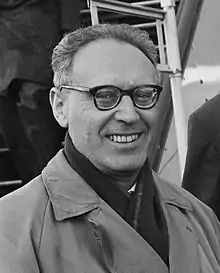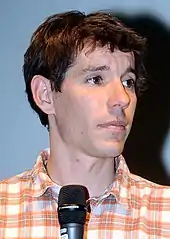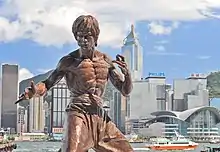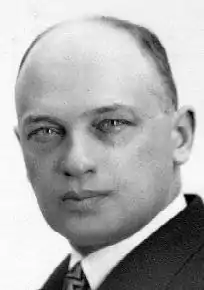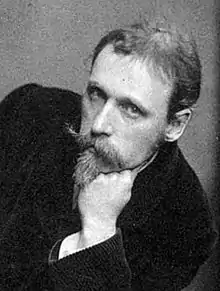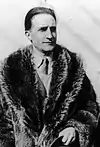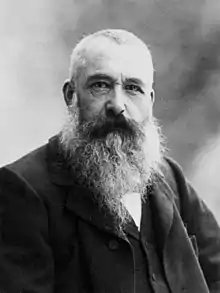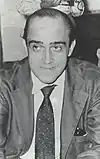This is a list of atheists. Living persons in this list are people whose atheism is relevant to their notable activities or public life, and who have publicly identified themselves as atheists.
Assassins
- Gavrilo Princip (1894–1918): Assassin of Austrian Archduke Franz Ferdinand and the Archduke's wife, Sophie, Duchess of Hohenberg, in Sarajevo on June 28, 1914.[1]
- Leon Czolgosz (1873–1901): Assassin of American President William McKinley on September 6, 1901.[2]
- Lee Harvey Oswald (1939–1963): Assassin of American President John F. Kennedy on November 22, 1963.[3]
Business
- John Baskerville (1706–1775): English typesetter, printing innovator and typefounder, designer of the typeface that bears his name.[4][5]
- Richard Branson (1950–): English business magnate, investor and philanthropist.[6][7]
- Andrew Carnegie (1835–1919): Scottish-American industrialist, who led the expansion of the steel industry. Later in life, he became one of the highest–profile philanthropists of his era.[8]
- Doug Casey (1946–): American libertarian economist, author of 4 books, including Totally Incorrect: Conversations with Doug Casey (2012).[9]
- Felix Dennis (1947–2014): British magazine publisher and philanthropist.[10]
- Larry Flynt (1942–2021): American publisher and the head of Larry Flynt Publications.[11]
- Stephen Girard (1750–1831): French sailor turned American banker and philanthropist.[12]
- Allan Pinkerton (1819–1884): Scottish-born American detective and spy, best known for creating the Pinkerton Agency, the first detective agency of the United States.[13]
- Graeme Samuel (1946–): Australian businessman, former chairman of the Australian Competition & Consumer Commission.[14]
- Clive Sinclair (1940–2021): British entrepreneur and inventor of the world's first 'slim-line' electronic pocket calculator and early personal computers.[15]
- Christer Sturmark (1964–): Swedish IT entrepreneur and chairman of The Swedish Humanist Organisation.[16]
- Alan Sugar (1947–): English entrepreneur, businessman, and television personality.[17]
- Jimmy Wales (1966–): American internet entrepreneur and co-founder and promoter of Wikipedia and Wikia.[18]
- Will Wyatt (1942–): British media consultant and company director, formerly a journalist, television producer and senior executive at the BBC.[19]
Comedians
- Dave Allen (1936–2005): Irish comedian, popular on United Kingdom and Australian television in the 1960s, 1970s and also in the 1990s.[20]
- Russell Peters (1970–): Canadian comedian.[21]
- Keith Allen (1953–): British comedian, actor, singer and writer, father of Lily Allen.[22]
- Wil Anderson (1974–): Australian television, radio and stand-up comedian, former host of ABC's The Glass House.[23]
- Chico Anysio (1931–2012): Brazilian comedian.[24][25]
- Matt Besser (1967–): American comedian.[26]
- Abie Philbin Bowman (19??–): Irish comedian and columnist, writer/director/performer of Jesus: The Guantanamo Years.[27]
- Marcus Brigstocke (1973–): English comedian, satirist and presenter of The Late Edition.[28]
- Adam Carolla (1964–): American comedian, actor and comedy writer.[29]
- Jimmy Carr (1972–): English-Irish comedian.[30]
- Dean Cameron (1962–): American actor, comedian and musician[31]
- Pat Condell (1951–): English comedian, writer and secularist.[32]
- Billy Connolly (1942–): Scottish comedian, musician and presenter, also known as an actor in films such as Lemony Snicket's A Series of Unfortunate Events, The Man Who Sued God and Mrs. Brown.[33]
- David Cross (1964–): American actor and comedian.[34]
- Larry David (1947–): American actor, writer, comedian, and producer.[35]
- Catherine Deveny (1968–): Australian comedy writer, stand-up comedian and sometimes controversial opinion columnist in the Age newspaper.[36]
- Emery Emery (1963–): American comedian, producer/director/editor and author and webshow host; outspoken atheist who is a contributing author of The Atheist's Guide To Christmas and host of webshow Ardent Atheist with Emery Emery.[37]
- Ben Elton (1959–): English comedian, writer and director.[38][39]
- Janeane Garofalo (1964–): American actress and comedian.[40]
- Ricky Gervais (1961–): British comedian and actor, co-creator of the original version of The Office.[41][42]
- Kathy Griffin (1960–): American comedian.[43]
- Greg Gutfeld (1964-): American comedian and Fox News correspondent
- Andy Hamilton (1954–): English comedian, game show panellist, director and comedy scriptwriter for television and radio.[44]
- Jeremy Hardy (1961–2019): English alternative comedian, frequently on BBC Radio 4 shows such as The News Quiz and I'm Sorry I Haven't a Clue.[45]
- Richard Herring (1967–): British comedian and writer, best known as part of Lee and Herring.[46]
- Robin Ince (1969–): English stand-up comedian, actor, writer and impressionist.[47]
- Reggie Watts (1972–): American musician, singer, beatboxer, actor, and comedian.
- Eddie Izzard (1962–): English stand-up comedian and actor, winner of several awards.[48]
- Jim Jefferies (1977–): Australian comedian.[49]
- Anthony Jeselnik (1978–): American comedian, television host, writer, producer, and actor.[50]
- Dom Joly (1967–): Award-winning British television comedian and journalist, best known as the star of Trigger Happy TV.[51]
- Myq Kaplan (1978–): American stand-up comedian.[52]
- Stewart Lee (1968–): English stand-up comedian, writer and director, best known as one half of Lee and Herring and for co-writing and directing the critically acclaimed and controversial stage show Jerry Springer: The Opera.[53]
- Seth MacFarlane (1973–): American actor, voice actor, animator, screenwriter, comedian, producer, director, and singer. He is best known as the creator of the animated sitcom Family Guy (1999–2003, 2005–present) and as co-creator of American Dad! (2005–present) and The Cleveland Show (2009–2013), for which he also voices many of the shows' various characters.[54]
- Bill Maher (1956–): American comedian, author, political satirist and host of HBO's Real Time with Bill Maher.[55]
- Jonathan Miller CBE (1934–2019): British actor, theatre and opera director, humorist, physician and television presenter. Wrote and presented the 2004 television series, Atheism: A Rough History of Disbelief, exploring the roots of his own atheism and investigating the history of atheism in the world.[56][57]
- Tim Minchin (1975–): Australian comedian, actor, composer, songwriter, pianist, musical director, winner of the 2005 Best Newcomer Perrier Comedy Award.[58]
- Dylan Moran (1971–): Irish comedian, most famous for the creation and role in hit British sitcom Black Books, as well as his work with Simon Pegg in movies such as Shaun of the Dead and Run Fatboy Run.[59]
- Dermot Morgan (1952–1998): Irish comedian and actor, who achieved international renown as Father Ted Crilly in the Channel 4 sitcom Father Ted.[60][61]
- Dara Ó Briain (1972–): Irish comedian and television presenter.[62]
- Patton Oswalt (1969–): American actor and comedian.[63]
- Volker Pispers (1958–): German political Kabarett artist and critic of capitalism.[64]
- Paula Poundstone (1959–): An American stand-up comedian. She is known for her quiet, self-deprecating style, political observations, and her trademark style of dress: a suit and tie.[65]
- Brian Quinn (1976–): American stand-up comedian and star of Impractical Jokers[66]
- Arthur Smith (1954–): English alternative comedian and writer.[67]
- Linda Smith (1958–2006): English comedian and comedy writer, president of the British Humanist Association from 2004 until her death.[68][69]
- Doug Stanhope (1967–): American stand-up comedian, former host of Comedy Central's The Man Show.[70]
- Julia Sweeney (1959–): American actor and comedian. Alumna of Saturday Night Live, author/performer of a one-woman autobiographical stage show about finding atheism: Letting Go of God.[71]
- Mark Thomas (1963–): English comedian, presenter, political activist and reporter, best known for political stunts on his show, The Mark Thomas Comedy Product on UK Channel 4.[72]
- Paul F. Tompkins (1968–): American comedian, actor and writer.[73]
- Gene Weingarten (1951–): Humor writer for The Washington Post.[74]
- Ricardo Araújo Pereira (1974–): Portuguese comedian, writer and actor.[75]
- Hannibal Buress (1983–): American comedian, actor, and producer.[76]
- Herman José (1954–): Portuguese comedian, actor and singer.[77][78]
Explorers
- Richard Francis Burton (1821–1890): English geographer, explorer, translator, writer, soldier, orientalist, cartographer, ethnologist, spy, linguist, poet, fencer and diplomat. He was known for his travels and explorations within Asia, Africa and the Americas, as well as his extraordinary knowledge of languages and cultures.[79]
- Ármin Vámbéry (1832–1913): Hungarian Turkolog and traveler.[80]
Historians
- Richard Carrier (1969–): American independent scholar and advocate for both atheism and metaphysical naturalism.[81]
- G. E. M. de Ste. Croix (1910–2000): British historian, specializing in examining the classical era from a historical materialist perspective.[82]
- Joseph Ellis (1943–): noted American historian of the United States, speaking on the publication of his 2018 book, American Dialogue: The Founders and Us.[83]
- Constantine Fitzgibbon (1919–1983): Irish-American historian and novelist.[84]
- George Grote (1794–1871): English classical historian, best known in that field for his voluminous History of Greece, still read.[85]
- Keith Hopkins (1934–2004): British classical historian and sociologist, professor of ancient history at the University of Cambridge 1985–2001.[86]
- Robin Lane Fox (1946–): English academic and historian, currently a Fellow of New College, Oxford, Lecturer in Ancient History at Exeter College, Oxford and University Reader in Ancient History.[87]
- James Murdoch (Scottish journalist) (1856–1921): Scottish scholar and journalist, whose three-volume History of Japan was the first comprehensive history of Japan in the English language.[88]
- Tony Parker (1923–1996): English oral historian, whose work was dedicated to giving a voice to British and American society's most marginalised figures.[89]
- Pierre Vidal-Naquet (1930–2006): French classical historian.[90]
Military
- Abdul Rashid Dostum (1954–): Afghani military figure, the current leader of Uzbek-Afghan northern provinces.[91]
- William Sholto Douglas, Baron Douglas of Kirtleside, Marshal of the Royal Air Force GCB, MC, DFC (1893–1969): Distinguished British airman, a senior figure in the Royal Air Force up to and during World War II.[92]
- Jeremy Hall (1985–): American army specialist who sued the U.S. Department of Defense, alleging his atheism led to discrimination, death threats and being denied promotions.[93]
- Chelsea Manning (1987–): American soldier who was arrested in May 2010 in Iraq on suspicion of having passed classified material to the website WikiLeaks.[94][95]
- Velupillai Prabhakaran (1954–2009): Sri Lankan guerrilla who founded the Tamil Tigers, a Marxist–Leninist organization that promoted atheism and was "adamantly opposed to religion".[96][97]
- Lakshmi Sahgal (1914–2012): Activist of the Indian independence movement, an ex-officer of the Indian National Army, Member of CPI (M), and the Minister of Women's affairs in the Azad Hind Government.[98]
Social sciences
- Hector Avalos (1958–2021): Mexican-American professor of Religious Studies at Iowa State University and author of several books about religion.[99]
- Scott Atran (1952–): American cultural anthropologist.[100]
- Gregory Bateson (1904–1980): English anthropologist, social scientist, linguist, visual anthropologist, semiotician and cyberneticist whose work intersected that of many other fields.[101]
- Raymond Cattell (1905–1998): British and American psychologist, known for his exploration of many areas in psychology.[102]
- Herbert de Souza (1935–1997): Brazilian sociologist and activist against economic injustice and government corruption in Brazil, and founder of the Brazilian Institute of Social Analysis and Economics (IBASE).[103]
- Albert Ellis (1913–2007): American psychologist who in 1955 developed Rational Emotive Behavior Therapy (REBT).[104]
- Hans Eysenck (1916–1997): German-British psychologist who spent most of his career in Britain, best remembered for his work on intelligence and personality, though he worked in a wide range of areas. At the time of his death, Eysenck was the living psychologist most frequently cited in science journals.[105]
- Leon Festinger (1919–1989): American social psychologist famous for his Theory of Cognitive Dissonance.[106]
- Norman Finkelstein (1953–): American political scientist and author, specialising in Jewish-related issues, especially the Holocaust and the Israeli–Palestinian conflict.[107]
- Sir Raymond Firth CNZM, FBA (1901–2002): New Zealand ethnologist, considered to have singlehandedly created a form of British economic anthropology.[108]
- Irving Fisher (1867–1947): was an American economist, inventor, and social campaigner. He was one of the earliest American neoclassical economists, though his later work on debt deflation has been embraced by the Post-Keynesian school. Fisher made important contributions to utility theory and general equilibrium. He was also a pioneer in the rigorous study of intertemporal choice in markets, which led him to develop a theory of capital and interest rates. His research on the quantity theory of money inaugurated the school of macroeconomic thought known as "monetarism." Some concepts named after Fisher include the Fisher equation, the Fisher hypothesis, the International Fisher effect, and the Fisher separation theorem.[109]
- Michel Foucault (1926–1984): French philosopher, historian, critic and sociologist.[110]
- Sigmund Freud (1856–1939): Austrian neurologist and known as Father of psychoanalysis.[111]
- Erich Fromm (1900–1980): German social psychologist, psychoanalyst, sociologist, humanistic philosopher, and democratic socialist. He was associated with what became known as the Frankfurt School of critical theory.[112]
- G. Stanley Hall (1844–1924): American psychologist and educator. His interests focused on childhood development and evolutionary theory. Hall was the first president of the American Psychological Association and the first president of Clark University.[113]
- Jonathan Haidt (c.1964–): Associate professor of psychology at the University of Virginia, focusing on the psychological bases of morality across different cultures, and author of The Happiness Hypothesis.[114]
- John Harsanyi (1920–2000): Hungarian-Australian-American economist and Nobel Memorial Prize in Economic Sciences winner.[115]
- Mayer Hillman (1931–): British political scientist, architect and town planner, a Senior Fellow Emeritus at the Policy Studies Institute.[116]
- Ernest Jones (1879–1958): British neurologist and psychoanalyst, and Sigmund Freud’s official biographer.[117]
- Herman Kahn (1922–1983): American futurist, military strategist and systems theorist. He was known for analyzing the likely consequences of nuclear war and recommending ways to improve survivability; a notoriety that made him an inspiration for the title character of Stanley Kubrick's classic black comedy film satire, Dr. Strangelove.[118]
- John Maynard Keynes (1883–1946): British economist who was one of the most influential economists of the 20th century.[119][120]
- Baruch Kimmerling (1939–2007): Romanian-born professor of sociology at the Hebrew University of Jerusalem.[121]
- Kemal Kirişci (1954–): Turkish political scientist, professor at the Department of Political Science and International Relations at Boğaziçi University, Istanbul.[122]
- Melanie Klein (1882–1960): Austrian-born British psychoanalyst who devised novel therapeutic techniques for children that influenced child psychology and contemporary psychoanalysis. She was a leading innovator in theorizing object relations theory.[123]
- Frank Knight (1885–1972): American economist who spent most of his career at the University of Chicago, where he became one of the founders of the Chicago school.[124]
- Jacques Lacan (1901–1981): French psychoanalyst and psychiatrist who made prominent contributions to psychoanalysis and philosophy, and has been called "the most controversial psycho-analyst since Freud".[125]
- Steven Landsburg (1954–): American economist.[126]
- Harold Laski (1893–1950): British political theorist, economist, author, and lecturer, active in politics (British Labour Party chairman, 1945–46), professor at the London School of Economics 1926–50. He repudiated his faith in Judaism, claiming that Reason prevented him from believing in God.[127]
- Peter Lawrence (1921–1987): British-born Australian anthropologist, pioneer in the study of Melanesian religions noted for his work on cargo cults.[128]
- Sir Edmund Leach (1910–1989): British social anthropologist, a Fellow of the British Academy.[129]
- James H. Leuba (1868–1946): American psychologist, one of the leading figures of the early phase of the American psychology of religion movement.[130]
- Cesare Lombroso (1835–1909): Italian criminologist, physician and founder of the Italian school of criminology.[131]
- Paolo Mantegazza (1831–1910): Italian neurologist, physiologist and anthropologist, noted for his experimental investigation of coca leaves into its effects on the human psyche.[132]
- Abraham Maslow (1908–1970): American psychologist. He was a professor of psychology at Brandeis University, Brooklyn College, New School for Social Research and Columbia University who created Maslow's hierarchy of needs.[133]
- Franz Leopold Neumann (1900–1954): German political scientist, known for theoretical analyses of National Socialism, and considered among the founders of modern political science in Germany.
- Will Provine (1942–2015): American historian of science.[134]
- Alfred Radcliffe-Brown (1881–1955): English social anthropologist who developed the theory of Structural functionalism.[135]
- Wilhelm Reich (1897–1957): Austrian psychiatrist and psychoanalyst, known as one of the most radical figures in the history of psychiatry.[136]
- David Ricardo (1772–1823): English political economist, scientist and stock trader. He was often credited with systematising economics, and was one of the most influential of the classical economists, along with Thomas Malthus, Adam Smith, and John Stuart Mill.[137][138]
- Carl Rogers (1902–1987): American psychologist and among the founders of the humanistic approach to psychology. Rogers is widely considered to be one of the founding fathers of psychotherapy research and was honored for his pioneering research with the Award for Distinguished Scientific Contributions by the American Psychological Association in 1956.[139]
- Murray Rothbard (1926–1995): American economist, historian and political theorist. He was a prominent exponent of the Austrian School of economics who helped to define capitalist libertarianism, and he popularized a form of free-market anarchism which he termed "anarcho-capitalism."[140][141]
- Edwin S. Shneidman (1918–2009): American clinical psychologist, suicidologist, and thanatologist who founded the Los Angeles Suicide Prevention Center in 1958.[142]
- Boris Sidis (1867–1923): Ukrainian psychologist, physician, psychiatrist, and philosopher of education.[143]
- Herbert A. Simon (1916–2001): American political scientist and economist, one of the most influential social scientists of the 20th century.[144]
- B. F. Skinner (1904–1990): American psychologist, behaviorist, author, inventor, social philosopher and poet.[145][146]
- Robert Spitzer (1932–2015): American psychiatrist, Professor of Psychiatry at Columbia University, a major architect of the modern classification of mental disorders.[147]
- Francesca Stavrakopoulou (1975–): Senior lecturer in the University of Exeter's department of Theology and Religion and presenter of the BBC series The Bible's Buried Secrets.[148]
- Claude Lévi-Strauss (1908–2009): French anthropologist and ethnologist, and has been called, along with James George Frazer, the "father of modern anthropology".[149]
- Laurie Taylor (1936–): British sociologist and radio presenter.[150]
- Georges Vacher de Lapouge (1854–1936): French anthropologist and eugenicist.[151]
- John B. Watson (1878–1958): American psychologist who established the psychological school of behaviorism.[113][152]
- Knut Wicksell (1851–1926): Swedish economist of the Stockholm school. His economic contributions would influence both the Keynesian and Austrian schools of economic thought.[153][154][155]
Sports
- Fernando Alonso (1981–): Formula One racer and two-time World Champion[156]
- Ken Anderson (1976–): Professional wrestler, currently signed with TNA, where he wrestles under his ring name Mr. Anderson.
- Tom Budgen, (1985–): Professional wrestler, currently signed with WWE, where he wrestles under the ring name Aleister Black
- Lance Armstrong, (1971–): Road racing cyclist.[157]
- Mikhail Botvinnik (1911–1995): Soviet and Russian International Grandmaster and three-time World Chess Champion, widely considered one of the greatest chess players of all time.[158]
- Alvin Burke, Jr (1973–): American professional wrestler for WWE and formally for TNA. Converted to Islam when in jail, but has since described himself as a nonbeliever.
- Brian Clough, (1935–2004): Association football manager, of Hartlepool United, Derby County, Brighton & Hove Albion, Leeds United and Nottingham Forest. Said in his 1994 autobiography that he didn't believe in an afterlife or a god.[159]
- Fausto Coppi (1919–1960): Italian racing cyclist, nicknamed Il Campionissimo ("the greatest champion") one of the most successful and popular cyclists of all time.[160]
- Jim Cornette (1961–): American professional wrestling manager, commentator, promoter, and booker.[161]
- Johan Cruyff (1947–2016): former Dutch footballer and manager for Ajax and Barcelona. He once quipped, "I don't believe in God, in Spain all 22 players cross themselves, if it works the game is always going to be a tie."[162][163]
- Robin Dixon CBE (1935–): British Olympic gold medal bobsledder, army Major, businessman, British and Northern Irish politician, latterly a member of the House of Lords.[164]
- Jan Hein Donner (1927–1988): Dutch chess grandmaster and writer.[165]
- Jonathan Edwards (1966–): British triple jumper. Former Olympic, European and World champion. Holds the current world record in the event.[166]
- Hugh Falkus (1917–1996): British writer, film maker, World War II pilot, but best known as an angler, with seminal books on salmon and sea trout fishing.[167]
- David Feherty (1958–): Irish golfer, a former European Tour and PGA Tour professional who now works as a writer and broadcaster.[168]
- Arian Isa Foster (1986–): Former American football running back for the Houston Texans and Miami Dolphins of the National Football League (NFL).[169]
- Dan Fouts (1951–): Former NFL quarterback for the San Diego Chargers and current NFL color commentator.
- Jan Frodeno (1981–): German triathlete, 2008 Olympic gold medalist and two-times Ironman World Champion.[170]
- Louis van Gaal (1951-) Dutch professional soccer manager and former player. He wrote in his autobiography: “When I lost Fernanda, it was then that I stopped believing in God and stopped being a Catholic.“This God did not respect the human being and the suffering of my wife. I want nothing to do with a God who lets people suffer this much.”
- Olga Galchenko (1990–): Juggler.[171]
- Pep Guardiola (1971-) Spanish professional soccer manager and former player
- Alex Honnold (1985–) American rock climber known for his incredibly long and difficult free solo climbs.[172]
- Bruce Lee (1940–1973): American born Chinese martial artist and actor.[173]
- Mike Mentzer (1951–2001): professional bodybuilder and 1979 Mr. Olympia heavyweight champion.[174][175]
- Jason Miller (1980–): Popular American mixed martial arts fighter and host of MTV's Bully Beatdown. Is noted for stating "After my victory, I would like to thank science."[176]
- Frank Mir (1979–): American mixed martial artist and broadcaster, former two-time UFC Heavyweight Champion.[177]
- Riccardo Montolivo (1985–): Italian soccer player who has represented his country at the FIFA World Cup.[178]
- Rafael Nadal (1986–): a Spanish professional tennis player.[179]
- Diana Nyad (1949–): American world record long-distance swimmer, and the first person confirmed to swim from Cuba to Florida without the protection of a shark cage.[180]
- Sarah Outen MBE FRGS (1985–): English adventurer, the first and only woman and the youngest person to row solo across the Indian Ocean.[181]
- Lee Priest (1972–): Australian professional bodybuilder.[182]
- CM Punk (1978–): American mixed martial artist and former professional wrestler.[183]
- Seth Rollins (1986–): American professional wrestler.[184]
- Aziz Shavershian (1989–2011): Australian bodybuilder and internet celebrity.[185]
- Nigel Short (1965–): English chess grandmaster.[186]
- Joe Simpson (1972–): British mountaineer, author and motivational speaker, famous for his book Touching the Void, subsequently filmed.[187][188]
- Matthew Syed (1970–): English table tennis international, three times the Men's Singles Champion at the Commonwealth Table Tennis Championships and competing for Great Britain in two Olympic Games, now a Times journalist.[189]
- Savielly Tartakower (1887–1956): Polish and French chess Grandmaster, the king of chess journalism in the 1920s and 1930s.[190]
- Pat Tillman (1976–2004): Former NFL strong safety for the Arizona Cardinals and United States Army Ranger, killed by friendly fire in the mountains of Afghanistan.[191][192][193][194]
- Dana White (1969–) President of Ultimate Fighting Championship[195]
- Ted Williams (1918–2002), "the greatest [baseball] hitter who ever lived".[196][197]
- Bob Woolmer (1948–2007): English international cricketer, professional cricket coach and commentator, playing in 19 Test matches and 6 One Day Internationals for England and later coaching South Africa, Warwickshire and Pakistan.[198]
Video games
- David Cage (1969–): French video game designer, writer and musician. He is the founder of the game development studio Quantic Dream. Cage both wrote and directed the video games Heavy Rain and Beyond: Two Souls for the PlayStation 3, and Detroit: Become Human for the PlayStation 4.[199]
- John D. Carmack (1970–): American computer programmer, engineer, and businessman. He co-founded id Software. Carmack was the lead programmer of the id video games Commander Keen, Wolfenstein 3D, Doom, Quake, Rage and their sequels.[200][201]
- Ken Levine (1966–): American game developer. He is the creative director and co-founder of Ghost Story Games (formerly known as Irrational Games). He led the creation of the BioShock series, and is also known for his work on Thief: The Dark Project and System Shock 2.[202][203]
Visual arts
- Abu Abraham (1924–2002): Indian political cartoonist, journalist, and author.[204]
- Franko B (1960–): British performance artist who uses his own body in his art.[205]
- Francis Bacon (1909–1992): Irish-born figurative painter whose work is known for its bold, austere, and often grotesque or nightmarish imagery.[206]
- Jemima Blackburn (1823–1909): Scottish painter and illustrator, especially of evocative images of rural life in 19th century Scotland.[207]
- Iwona Blazwick OBE (1955–): British art gallery curator, Director of the Whitechapel Art Gallery in London.[208]
- Berkeley Breathed (1957–): American cartoonist, children's book author/illustrator, director, and screenwriter, best known for the cartoon strip Bloom County.[209]
- Joan Brossa (1919–1998): Catalan graphic designer and plastic artist, one of the leading early proponents of visual poetry in Catalan literature.[210]
- Henri Cartier-Bresson (1908–2004): French photographer considered to be the father of modern photojournalism, an early adopter of 35 mm format, and the master of candid photography, who helped develop the influential "street photography" style.[211][212]
- Mitch Clem (1982–): American cartoonist and webcomic author.[213]
- Walter Crane (1845–1915): English artist and book illustrator, a main contributor to the child's nursery motif in English children's illustrated literature of the latter 19th century.[214]
- Eric de Maré (1910–2002): British architectural photographer.[215]
- Eugène Delacroix (1798–1863): French Romantic artist regarded from the outset of his career as the leader of the French Romantic school.[216]
- Vincent Deporter (1959–): Writer/illustrator and cartoonist. Published in Europe (Spirou, Glenat, Dupuis...) and the United States (DC Comics, Nickelodeon Magazine...), and writer-illustrator for the SpongeBob Comics.
- Barry Driscoll (1926–2006): British painter, wildlife artist and sculptor.[217]
- Marcel Duchamp (1887–1968): French artist whose work is most often associated with the Dadaist and Surrealist movements. Considered to be one of the most important artists of the 20th century.[218]
- John Ernest (1922–1994): American-born artist, a key member of the British constructivist art movement.[219]
- Ernst Ludwig Freud (1892–1970): German/Austrian architect, the youngest son of Sigmund Freud.[220]
- Sam Fullbrook (1922–2004): Prize-winning Australian artist.[221]
- Peter Fuller (1947–1990): British art critic and magazine editor, founding editor of the art magazine Modern Painters and art critic of The Sunday Telegraph.[222]
- Sir Alfred Gilbert (1854–1934): English sculptor and goldsmith, central participant in the New Sculpture movement.[223]
- Sir Ernst Gombrich OM, CBE (1909–2001): Austrian-born British art historian.[224]
- Antony Gormley OBE, RA (1950–): English sculptor, famous for his Angel of the North.[225]
- George Grosz (1893–1959): German draughtsman and painter, a prominent member of the Berlin Dada and New Objectivity group.[226]
- Brion Gysin (1916–1986): British painter, writer, sound poet, and performance artist.[227]
- Damien Hirst (1965–): English artist, internationally renowned and the most prominent member of the group known as "Young British Artists".[228]
- Alfred Hrdlicka (1928–2009): Austrian sculptor, draughtsman, painter and artist, whose 2008 religious work about the Apostles, Religion, Flesh and Power, attracted criticism over its homoerotic theme.[229]
- Mark Hofmann (1954–): Prolific counterfeiter and ex-Mormon who murdered two people in Salt Lake City, Utah.[230][231]
- Sebastian Horsley (1962–2010): English artist and writer, best known for having undergone a voluntary crucifixion.[232]
- Waldemar Januszczak (1954–): British art critic, former Guardian arts editor and maker of television arts documentaries.[233]
- Charles-Édouard Jeanneret-Gris, known as Le Corbusier (1887–1965): Swiss-born architect, designer, urbanist, writer and also painter, famous for his contributions to what now is called Modern Architecture.[234]
- Giulio Mancini (1558–1630): Italian biographer and writer on art, art collector and noted physician.[235]
- Giacomo Manzù (1908–1991): Italian sculptor.[236]
- Henri Matisse (1869–1954): French artist, known for his use of colour and his fluid and original draughtsmanship. He was a draughtsman, printmaker, and sculptor, but is known primarily as a painter. Matisse is commonly regarded, along with Picasso and Marcel Duchamp, as one of the three artists who helped to define the revolutionary developments in the plastic arts in the opening decades of the 20th century, responsible for significant developments in painting and sculpture.[237]
- Alexander McQueen CBE (1969–2010): English fashion designer.[238]
- Claude Monet (1840–1926): French painter. Best known as a founder of French impressionist painting.[239][240]
- Sean Murphy: American comics writer/artist, known for his work on Hellblazer: City of Demons, Joe the Barbarian and American Vampire: Survival of the Fittest.[241]
- Oscar Niemeyer (1907–2012): Brazilian architect, considered one of the most important names in international modern architecture.[242]
- Jorge Oteiza (1908–2003): Basque sculptor, painter, designer and writer, renowned for being one of the main theorists on Basque modern art.[243]
- Grayson Perry (1960–): English artist, best known for his ceramics and for cross-dressing, the first ceramic artist and public transvestite to win the Turner Prize.[244]
- Pablo Picasso (1881–1973): Spanish painter, sculptor, printmaker, ceramicist, and stage designer. One of the greatest and most influential artists of the 20th century, he is widely known for co-founding the Cubist movement, the invention of constructed sculpture, the co-invention of collage, and for the wide variety of styles that he helped develop and explore.[245][246]
- Gwen Raverat (1885–1957): English wood engraving artist who co-founded the Society of Wood Engravers in England.[247]
- Gerhard Richter (1932–): German artist, considered one of the most important German artists of the post-World War II period.[248]
- Bryan Robertson OBE (1925–2002): English curator and arts manager, "the greatest Director the Tate Gallery never had".[249]
- Mark Rothko (1903–1970): Latvian-born American painter and printmaker, classified as an abstract expressionist, although he rejected the label.[250]
- Martin Rowson (1959–): British political cartoonist, novelist and satirist.[251]
- Maurice Sinet, known as Siné (1928–2016): French radical left-wing cartoonist.[252]
- Brendan Powell Smith (19??–): American artist, author, and creator of The Brick Testament, which illustrates stories from the Bible by dioramas of LEGO bricks.[253]
- "Normal" Bob Smith (1969–): American graphic artist, who prompted controversy with his creation of Jesus Dress Up.[254]
- Kurt Westergaard (1935–2021): Danish cartoonist, creator of a controversial cartoon of the Muslim prophet Muhammad wearing a bomb as a turban which was part of the Jyllands-Posten Muhammad cartoons controversy.[255]
- Frank Lloyd Wright (1867–1959): American architect, interior designer, writer and educator, who designed more than 1,000 structures and completed 500 works. Wright believed in designing structures which were in harmony with humanity and its environment, a philosophy he called organic architecture.[256]
References
- ↑ Owings, W.A. Dolph (1984). The Sarajevo Trial. Documentary Publications. p. 86. ISBN 0-89712-122-8.
Premuzic: Do you believe in God, or are you more an atheist? Princip: Atheist.
- ↑ Scott Miller, The President and the Assassin: McKinley, Terror, and Empire at the Dawn of the American Century, p. 77
- ↑ The Warren Commission Report, p. 690
- ↑ Baskerville left directions that his body be buried "in a Conical Building in my own premises Hearetofore used as a mill which I have lately Raised Higher and painted and in a vault which I have prepared for It. This Doubtless to many may appear a Whim perhaps It is so—But it is a whim for many years Resolve'd upon, as I have a Hearty Contempt for all Superstition the Farce of a Consecrated Ground the Irish Barbarism of Sure and Certain Hopes &c I also consider Revelation as it is call'd Exclusive of the Scraps of Morality casually Intermixt with It to be the most Impudent Abuse of Common Sense which Ever was Invented to Befool Mankind." He also wrote his epitaph: "Stranger—Beneath this Cone in Uncons[e]crated Ground / A Friend to the Liberties of mankind Directed his Body to be Inhum'd / May the Example Contribute to Emancipate thy mind / From the Idle Fears of Superstition / And the wicked arts of priesthood." Both quoted in James Mosley, 'Baskerville, John (1706–1775)', Oxford Dictionary of National Biography, Oxford University Press, 2004 (accessed May 7, 2008).
- ↑ "Baskerville, designer of the type that bears his name and one of Birmingham's best known citizens, was an atheist and anticleric whose will contained a vitriolic attack on the Church." 'Printer's Reburial Demanded', The Times March 9, 1963; pg. 6; Issue 55645; col A.
- ↑ Richard Branson states he believes in evolution Asked about belief in God, Richard Branson says he believes in evolution Archived October 10, 2016, at the Wayback Machine, by CNN, September 15, 2011. "Morgan: Do you believe more or less in God since the day after your conversation over diner? Branson: Hum... I believe in evolution. (...) I do think that religion has done a lot of harm over the years and just because one's born in one country and not another country, one shouldn't necessarily think 'our god is the right god and somebody else's god is the wrong god', so... I see myself as a humanitarian who loves people. Maybe one day somebody will be able to convince that there is a god and there is a particular god, but... I love people and that's to me the most important thing. (...) Morgan: and despite the fact that you survived that, Richard, with the .1%, you still don't believe! Branson: I would love to believe, and I think it's very comforting to believe (...) If somebody can convince me that there is a god, it would obviously be wonderful (...)"
- ↑ Branson, Richard. Losing My Virginity. Random House, 2011, p. 239. "I do not believe in God, but, as I sat there in the damaged capsule, hopelessly vulnerable to the slightest shift in weather or mechanical fault, I could not believe my eyes."
- ↑ Carnegie, Andrew. Autobiography of Andrew Carnegie (1920, 2006). ISBN 1-59986-967-5 (p. 339)
- ↑ July 13, 2013 C-SPAN2 Book TV interview with Doug Casey at Freedomfest 2013, held at Las Vegas.
- ↑ "I don't read novels unless they are 25 years old, but I have a passion for biography, history, philosophy and popular science. The original popular science writer was Charles Darwin in The Voyage of the Beagle. I must have read it 25 times. My favourite modern writer is Loren Eiseley, who wrote very poetically. I get consolation from such books, maybe because I waver between atheism and agnosticism." Felix Dennis interviewed by Jodie Jones, The Daily Telegraph, March 29, 2008, Weekend, Pg. 3.
- ↑ Flynt writes "I have left my religious conversion behind and settled into a comfortable state of atheism" in the epilogue of his autobiography An Unseemly Man: My Life As A Pornographer, Pundit And Social Outcast by Larry Flynt and Kenneth Ross (1996) ISBN 0-7871-1143-0
- ↑ Gray, Carole (Spring 1999). "The Atheist Who Saved The United States (...and the thanks he got for it)". The American Atheist. 37 (2): 34–44. Archived from the original on June 4, 2008.
One of his longtime employees, whose father had also worked for Stephen, said of him, "on the subject of religion, his opinions were atheistical. Let not the reader start, to find himself in company with one, who utterly disbelieved in all modes of a future existence, and who rejected with inward contempt every formulary of religion, as idle, vain, and unmeaning. Yet such were the convictions of Girard, held to his dying hour, and perpetuated in his last testament as a legacy to future generations .... He was known to be totally irreligious; and to attempt to conceal what is notorious, would be to suppress one of the most extraordinary features of his character."
- ↑ "Although christened by a Baptist minister in the Gorbals (August 25, 1819), he had a churchless upbringing and was a lifelong atheist." Richard Davenport-Hines, 'Pinkerton, Allan (1819–1884)', Oxford Dictionary of National Biography, Oxford University Press, 2004 (accessed May 2, 2008).
- ↑ "Well in my own mind I'm absolutely certain. I'm not agnostic, I'm an atheist, but that's a view that's been formed over I guess, 45 years of thinking and of analysing and just – and I have no embarrassment about it, no shame about it, nor any pride. It's my way of life, my way of thinking. I'm an atheist. And I have to say to you that although there are still many who strongly adhere to religions of one form or another, I find many others that when you actually out yourself as an atheist, say, 'Yes, well so am I'." Terry Lane interviews Graeme Samuel, BigIdeas, ABC Radio National, May 28, 2006 (Accessed July 2, 2007)
- ↑ "Oh God no," says Sir Clive Sinclair. "I was once asked [to be a godparent] and I said I can't, I'm an atheist. Actually I think I did have a couple, once, but I can't say I looked after them. Sort of lost them, or forgot about them." Rosie Millard, 'Godparenthood that rests on fame, not faith', The Independent (London), February 28, 1998, Page 15.
- ↑ (in Swedish) Translation: I am also an atheist. I find that just about everybody are atheists. The religions of the world has created many gods. Hinduism has millions. Most of the people I meet that call themselves Christians are atheists when it comes to all gods, except for one. Jag är en sökare!
- ↑ " He also says he is dead proud of his Jewishness. "Not in a religious way – I don't believe in God and all that. But I am Jewish, and very proud to be so, very proud of the culture." " Sam Wollaston interviewing Sugar, 'Sir Alan will see you now', The Guardian (London), March 25, 2009, Features pages, Pg. 8 (online version. Retrieved March 25, 2009).
- ↑ "Jimmy Wales". What do you believe?. Big Think Media. August 10, 2007. Retrieved November 27, 2011.
I'm a complete non-believer.
- ↑ "Mr Wyatt, an atheist, said that he had no axe to grind, and was struck by how much more different – "and accurate" – the BBC's description of Christianity was, where the birth of Jesus was mentioned as being "believed by Christians" and that Jesus "claimed" that he spoke with the authority of God." Hugh Davies, 'BBC site guilty of 'cringeing' ', The Daily Telegraph, February 8, 2006, Pg. 7.
- ↑ "Allen had little time for those who unquestioningly accept the tenets of any creed or system of thought. He applied this stricture equally to himself, and used humour to undermine even his own scepticism ("I'm an atheist, thank God"). [...] "His baffled humanity," wrote Charles Spencer, the theatre critic of The Daily Telegraph, in 1993, "his perplexity in the face of life's mysteries and irritations, are the qualities that make him such a fine and sometimes moving comedian. He's a blaspheming atheist on the side of the angels." " Obituary of Dave Allen, The Daily Telegraph, March 12, 2005, Pg. 029.
- ↑ "Russell Peters Celebrates 25 Years in Comedy with Massive Crowds, Big DVD Sales". July 15, 2015.
- ↑ "One of the many reasons Allen made the documentary was to explore his own atheism. Unlike most non-believers, he claims, in all seriousness, to have once seen God. It was at Glastonbury during the 1980s, and (as is the case with most of the splendid anecdotes that litter his conversation), it involved enough mind-altering substances to stun a baby elephant. [...] Like any considered atheist, particularly one who will burn in Hell, he lives according to a moral code that refuses to romanticise things like love, or devotion." Guy Adams, Serious documentary maker? Is Keith Allen having a laugh?, The Independent June 21, 2007 (accessed April 25, 2008).
- ↑ 'Of course, Anderson has never avoided controversy, but this show promises to be his most contentious yet. As an out-and-proud atheist, he's asking, "If the world truly does have an intelligent design, why is everything so f—ed?"'—Lallo, Michael (April 5, 2007), Wil to Succeed, The Age, Fairfax Media. Retrieved November 15, 2007.
- ↑ Chico Anysio fica revoltado com morte do filho de Cissa Guimarães: "que Deus é este?" Archived March 25, 2014, at the Wayback Machine
- ↑ "Ateu, Chico Anysio teve de enfrentar a ira de crentes". paulopes.com.br.
- ↑ ""My name is Matt Besser, and I'm an Arkansas Razorback. My father is a Jew from Little Rock, Ark., my mother was a Christian from Harrison, Ark., and somehow I'm an atheist now living in L.A. I am a Razorback living in the Razorback diaspora." Thus begins Woo Pig Sooie, Matt Besser's one-man comedic rant that fearlessly confronts all the folly and confusion of what it means to be religious in America."'Razor Sharp Archived August 31, 2009, at the Wayback Machine', Nashville Scene, June 1, 2006 (accessed August 20, 2008).
- ↑ "Don't expect Jerry Springer-style controversy, however. Bowman, an atheist, has found that "most Christians are so disgusted by Guantanamo that I don't get many people saying it's offensive". And playing Jesus has even infiltrated his own personality: "I feel myself being more humble and trying to understand people with compassion rather than getting angry." " Emma John, 'A funny thing happened on the way to redemption', The Guardian, August 14, 2006, G2, Pg. 22.
- ↑ During an episode of The Late Edition filmed in October 2007, Brigstocke was presented with an Out Campaign t-shirt by his guest and out-spoken Atheist Richard Dawkins to which Brigstocke replied: "Look at that. Outed, outed as an Atheist and proud to be so"
- ↑ When asked by Penn Jillette if he was an atheist, Carolla replied "Yes." Interview on Penn Radio, March 9, 2006. Audio. Retrieved October 29, 2007.
- ↑ "There's no God – grow up!". Jimmy Carr (2007). Jimmy Carr Comedian (DVD). Channel 4 DVD.
- ↑ "episode 167 – april 8, 2015". Ardent Atheist. Retrieved August 18, 2015.
- ↑ "Pat Condell: interview". Time Out London. Archived from the original on January 22, 2009. Retrieved May 27, 2008.
- ↑ "Connolly has tackled drama before, notably in the film Mrs Brown, with Dame Judi Dench, but he's never portrayed anyone like Father Joe, who is psychic and possibly deranged. "I was brought up as a Catholic," Connolly says. "Aye, I have a cousin who is a nun and another cousin who is a missionary priest in Pakistan." He pauses and smiles. "And I am an atheist." " Elaine Lipworth interviewing Connolly, 'No laughing matter', Independent (Dublin), August 1, 2008 (accessed August 1, 2008).
- ↑ Appearance on ABC's Politically Incorrect (March 9, 1998) "I was born Jewish, but I am an atheist. I don't believe in God."
- ↑ Dolan, Deirdre (2006). Curb Your Enthusiasm: The Book. Gotham Books. p. Front Matter.
- ↑ "I don't give a stuff what people believe in, but it won't stop me poking at it or prodding it. Why should religion be any exemption? Telling me I'm going to hell won't bother me because I have the Flying Spaghetti Monster, the Invisible Pink Unicorn and Bertrand Russell's Teapot in my heart. Google them if you are in the market for some red hot enlightenment. Over the past couple of weeks Catholic-bashing has been elevated to the level of an extreme sport. Put your hand down at the back there, I'm allowed to. I spent every Sunday for the first 18 years of my life sitting in a medieval torture chamber listening to a bloke bang on about his imaginary friend who did magic tricks. Then the next 20 years massaging, editing and pruning the brainwashing into something that fit until suddenly I woke up one day and realised I was an atheist. I wasn't searching for anything. I wasn't dabbling or questioning. I wasn't having any kind of spiritual breakdown. I just opened my eyes one day, looked around and realised that I had once been standing in a house and one by one the walls had collapsed and there was no longer a house there. I was standing out in the open. It was very liberating." Catherine Deveny, 'Red hot enlightenment led me to believe in one fewer god', July 23, 2008 (accessed July 22, 2008, 13.00 BST).
- ↑ "Ardent Atheist - Where Reason Reigns Supreme!". Archived from the original on July 14, 2012. Retrieved April 28, 2011.
- ↑ "The comedian [...] said Britons should be taught the essentials of Christianity, if only for cultural reasons. But he also said that "lack of faith" should be taught in schools. "I think the concept that faith in itself is a good thing should be questioned from day one, which it isn't," he said. "There's a presumption that if you're a religious leader you are in some way already halfway up to the moral high ground and your opinion has more relevance than anyone else's." BBC 'too scared to allow jokes about Islam', April 2, 2008. (Accessed April 3, 2008)
- ↑ "Elton described himself as an atheist but said he was in favour of God defined as "the mystery of the universe". His children attend a Church of England school and he said he attended church occasionally." BBC 'scared' of Islam jokes, says Elton, The Guardian, April 2, 2008 (accessed April 3, 2008)
- ↑ "Garofalo said "I am a proud atheist." Freethought Radio interview with Janeane Garofalo, May 26, 2007 (quote starts at 19:32). (Accessed June 9, 2007)
- ↑ Gervais states he is an atheist in his Animals live DVD. Also, in a PBS "Fresh Air" interview, December 18, 2006 he said "I'm an atheist," and that Homer Simpson was the closest thing for him to God.
- ↑ In an interview with Daily Mirror, Gervais said: "I'm basically a 'do unto others' type person. I don't have any religious feelings because I'm an atheist, but I live my life like there's a God. And if there was he'd probably love me." See Official homepage (Accessed December 21, 2007).
- ↑ Speaking to Sacramento's Outword Magazine, Griffin said: "...I think I'm getting more atheist because of the way the country is getting more into bible-thumping." See Quotelines, by Rex Wockner at Windy City Times (Accessed August 29, 2006).
- ↑ "A book that changed me ... The Bible. It turned me into an atheist." 'Andy Hamilton, comedian Archived April 17, 2008, at the Wayback Machine', The Independent (London), March 10, 2007 (accessed July 22, 2008).
- ↑ "And what about religion? Mr Hardy has always been an atheist. "If people become religious as a result of a prison sentence or a nervous breakdown, that's fine, but it isn't something that should be indoctrinated into children. If God wants to reveal himself, then let him reveal himself to people who have been through puberty and got their hormones settled down." " Fran Abrams interviewing Hardy, 'Comic Takes Teachers Near The Funny Bone', Times Educational Supplement, May 3, 2002, Pg.10.
- ↑ "In the programme for It's Not the End of the World, Richard Herring, its writer and star, admits that, like the play's "make-believe character Ian Nathan," he first found out about Nostradamus in Weston-Super- Mare in 1984. On reading about the predicted apocalypse, 16-year-old Herring convinced himself that, to survive, he'd have to escape somewhere remote in July 1999. Even though he's now a "rational atheist", Herring made sure he had his just-in-case cake and ate it when he escaped to Fiji last month with "the convenient excuse of researching and writing this play"." Maeve Walsh, 'Edinburgh Festival Fringe', The Independent (London), August 22, 1999, Features, Pg. 6.
- ↑ "As with most TV recordings, everything was running late and I had another gig not long after this one. Stephen Green was the only person who requested make up (such vanity must spit at the lord) while we atheists were left to be the pasty, snaggle-toothed demons we are presumed to be. [...] I told them how I couldn't find a teacher amongst my friends who was not involved in a nativity and how I, as an atheist, was happy to see that wherever I travelled there were carol singers and Christmas things. Stephen Green decided he would not believe me and kept saying, 'I don't think he's as happy about that as he said'. Yes I am, I just don't like people being fed with lies. [...] As I walked off after expounding on my atheist ire, I was reminded of another terrifying moment of lazy theorising from the slack-eyed Christian propagandists and hack icons. They proudly declared how Christian the nation was according to the most recent census. Then, they whined about how few children knew where Jesus was born." Robin Ince, 'The day I went psycho on TV', Chortle, December 20, 2007 (accessed September 30, 2008).
- ↑ "Izzard is now back on the road with "Stripped," his first national tour in five years. The comedian, who returns to Cleveland for two dates Friday and Saturday at the Palace Theatre, said his current material is based largely around the notion of God. Specifically, Izzard said over the past few years he's been transformed from an agnostic into an atheist and he's using "Stripped" as a vehicle to present his argument. "What's kind of interesting is America really seems to be locked in step with God," Izzard said. "I just see god and the devil inside of people, as opposed to being up in the clouds. And why would he be in the clouds, it's so damp. Why would he have 4.5 billion years of the Earth and only develop language over the past 100,000 years? Because you can't have religion without language. And if you look at the voting record of God, it's (expletive). There's too much death, pestilence, all of that hell. Why did he do all that and if he didn't do that, then what's the point of that? He isn't controlling everything. I'm sure the Jewish people prayed really hard during World War II and nothing seemed to happen. That's my big conclusion." " John Benson interviewing Izzard, Comedian Izzard finds edge on stage, May 22, 2008 (accessed June 13, 2008).
- ↑ "But Jefferies isn't just cruising on shock appeal. His long bit on why he's an atheist, while it may offend some religious folks, is well crafted, funny and doesn't rely at all on four-letter words." David Hinckley reviewing Jefferies's I Swear to God, 'For jokes, Jefferies follows true coarse', Daily News (New York), May 16, 2009, Pg. 51.
- ↑ Rader, Dotson (July 2, 2013). "Comedian Anthony Jeselnik: 'I React to Sad Things with Humor'". Retrieved September 17, 2015.
- ↑ On the introduction by his children of a swearbox to his household, Joly wrote: "Our biggest area of contention at home is blasphemy. Jackson follows me round the house waiting for me to say "oh Jesus" or "for God's sake", two of my favourite expressions. I tried to get a ruling excluding these from punishment, on the grounds that I'm an atheist and don't consider them to be swear words." Dom Joly: It's 50p a swear word... and the pot stands at £75, The Independent, April 20, 2008 (accessed April 21, 2008).
- ↑ official website Archived November 25, 2010, at the Wayback Machine
- ↑ " Nevertheless, they do take time to respond to their critics. "We're not ignorant," Lee says. "If a Christian writes and says they don't like it, I always write back explaining I'm an atheist and telling them where they can get more literature on the subject." " Janie Lawrence interviewing Lee and Herring, The Independent (London), December 14, 1996, Pg. 39.
- ↑ "BGF: Seth MacFarlane | \ | Advocate.com". Archived from the original on November 10, 2010. Retrieved September 30, 2009.
- ↑ On a November 1, 2009 airing of Imus in the Morning when asked by Don Imus about rumors of marriage, Maher: "I said, well, tell them the truth, neither me nor my girl believe in God or marriage, so there is not going to be a big church wedding." When asked whether he thought Christopher Hitchens was a 7 on Dawkins' scale of 1–7 (1 being absolutely certain there is a God and 7 being absolutely certain there isn't, a scale on which Dawkins considers himself 6.9), Maher answered with: "He may be, I think we are all just talking semantics at some point, we are all atheists which means we don't believe in the deity, we don't believe in a magic spaceman, and that we think people who do, have a neurological disorder and they need help."
- ↑ A Rough History of Disbelief Archived November 30, 2011, at the Wayback Machine Official BBC site describing the series
- ↑ On the filming of The Atheism Tapes with Sir Jonathan Miller: "We had been friends for a number of years, and had discussed a great many topics, but we had never, except glancingly, ever spoken about religion. We knew about our shared atheism, but the subject didn't seem to warrant much attention; in the Miller-McGinn world it was a non-existent topic. [...] It is often forgotten that atheism of the kind shared by Jonathan and me (and Dawkins and Hitchens et al.) has an ethical motive." Atheism Tapes, Colin McGinn, on his blog. (Accessed April 1, 2008)
- ↑ "It's not just his own pretensions that Minchin likes to skewer. He is a punchy atheist who devours scepticism in literature and podcasts. For example, he will announce mildly, "This is a song about anal sex and God", or croon an emotional ballad, the kind that wouldn't be out of place on a Whitlams album, about his profound scepticism of homeopathy." Jackie Maley interviewing Minchin, 'Scary weird little guy', Sunday Age (Melbourne, Australia), July 13, 2008, Section M, Preview; Pg. 24.
- ↑ Moran says in the video of his live show Monster: "To me religion seems like a bunch of people talking to their imaginary friend." Quoted in the IMDB entry for Monster.
- ↑ "Craggy Island would soak up the irony. From beyond the grave, Dermot Morgan, a staunch atheist who savaged the Catholic Church, is delivering a final kick to the priests who gave him a hero's send-off." Rory Carroll, 'Catholic critic Father Ted still causing controversy', The Guardian, April 23, 1998, Pg. 4.
- ↑ "Father Ted is dead". spiritofgenovia.com. Archived from the original on March 3, 2016. Retrieved August 19, 2008.
- ↑ "He enjoyed the Jesuit's discomfort because, despite his Catholic upbringing, he is "deeply, deeply atheist". But he's not Richard Dawkins, he says. "I don't have in my heart the anger some people have about it. It's just an absence. People talk about, 'Is religion the answer?' I just don't have the question. At all. There's no void, no gap." " 'Dara O'Briain interview – Laughter lines', Scotsman.com (accessed April 20, 2012).
- ↑ "[Oswalt is] an atheist..." MySpace must be doing something right Archived October 16, 2007, at the Wayback Machine, Chicago Sun-Times, October 5, 2006 by Andy Ihnatko (Accessed December 20, 2006)
- ↑ Clearly states in several recordings of his shows, that he is an atheist. For example, on his "...live 2012"-CD (recorded in Forum Wasserturm, Meerbusch in February 2012).
- ↑ Paula Poundstone has mentioned her atheism in several appearances on the radio show, Wait Wait... Don't Tell Me!. She also states that she is an atheist on her website. "The Official Paula Poundstone Website". Archived from the original on September 15, 2008. Retrieved September 28, 2008.
- ↑ "Brian Q Quinn on Twitter".
- ↑ "Digger: What makes you laugh and what makes you sad? Arthur: Laugh... Woody Allen. Sad ... The patent mortality that lurks at the edge of one's vision. Digger: The fact that we know we're going to die? Arthur: Yes, I speak as a rationalist and an agnostic/atheist – the essential tragedy of the end of life." Digger talks to Arthur Smith, comedian and writer Archived September 15, 2008, at the Wayback Machine, January 2008 (accessed July 15, 2008).
- ↑ "But it was secondary school, Bexleyheath Comprehensive, that really put me off God. I suddenly thought in assembly that this was all rubbish, all these stupid old gits like the headmaster and the deputy headmaster reading out this piffle and all these sulky kids moving their mouths to these hymns. I do remember enquiring whether or not you could be removed from assembly on the grounds of being an atheist, but I was told that it didn't count. You could only be excluded if you were Jewish, Catholic or Muslim. But not believing in God was not a valid reason." Linda Smith, Anarchist with attitude: Laurie Taylor interviews Linda Smith, New Humanist Volume 119 Issue September 5/October 2004 (accessed April 22, 2008)
- ↑ "An atheist from childhood, Linda Smith was appointed president of the British Humanist Society in 2004, declaring her intention to wake up a society which she felt had become stuck in the past." Daily Telegraph obituary: Linda Smith, March 1, 2006 (accessed April 22, 2008).
- ↑ "It's important that our community shows that we have your back when you come out publicly as an atheist. Let's show the world that you don't need to believe in a god to have human compassion nor does all charity fall under the banner of religion." Atheists Unite May 23, 2013 (accessed January 24, 2014)
- ↑ Interview with Sweeney discussing her atheism .
- ↑ "I've been an atheist since the age of eight. A visiting pastor at church performed a magic trick that ended with him tapping a chalice and it filling with coins. I asked him how he did it and he said, 'All you need is faith,' When I got home I rushed down to the cellar and found an old Half Corona tin and a stick from my dad's wood box (he was a self-employed builder). I sat there for an hour and left an atheist." The world of Mark Thomas, comedian, The Daily Telegraph, December 1, 2007 (accessed April 10, 2008).
- ↑ Paul F. Tompkins on His Mother and Atheism .
- ↑ "I found that Archie thing completely creepy. Is that because I am an atheist?" , The Washington Post, August 7, 2007. (Accessed August 15, 2007)
- ↑ Renascença (February 17, 2017). ""Sou um ateu especial". O que Ricardo Araújo Pereira vai dizer aos católicos" [“I'm a special atheist”. What Ricardo Araújo Pereira is going to tell Catholics]. Rádio Renascença (in European Portuguese). Retrieved April 2, 2020.
Define-se como "um ateu que não vacila", mas gosta do diálogo [He defines himself as "an unwavering atheist", but he likes the dialogue].
- ↑ "Hannibal Buress Would Prefer You Didn't Snapchat a Picture of Him in Bed". Vanity Fair. February 3, 2016.
- ↑ "Herman José: "Foi uma luta muito solitária e muitas vezes assustadora"" [Herman José : "It was a very lonely and sometimes scary battle"]. Notícias ao Minuto (in Portuguese). March 5, 2019. Retrieved April 2, 2020.
Sobre a relação com Deus, o humorista mantém as suas convicções e define-se como ateu (...) [About his relation with God, the comedian maintains his convictions and defines himself as an atheist (...)]
- ↑ "Herman e Isidro: dois gigantes à conversa" [Herman and Isidro: two giants have a chat]. Notícias Magazine. November 29, 2017. Retrieved April 2, 2020.
(...) Herman José, 63, é ateu [(...) Herman José, 63, is an atheist].
- ↑ Wright, Thomas (1906). The Life of Sir Richard Burton. Library of Alexandria. ISBN 978-1-4655-5013-2.
Some three months before Sir Richard's death," writes Mr. P. P. Cautley, the Vice-Consul at Trieste, to me, "I was seated at Sir Richard's tea table with our clergy man, and the talk turning on religion, Sir Richard declared, 'I am an atheist, but I was brought up in the Church of England, and that is officially my church.'
- ↑ Germany, Turkey, and Zionism 1897–1918. Transaction Publishers. 1997. p. 97. ISBN 978-1-4128-2456-9.
When Herzl met him on 16 June 1900 he was seventy years old, not clear about his own identity, whether a Turk or an Englishman, but his study of religions had made him an atheist.
- ↑ Carrier, Richard (2005). Sense and Goodness without God: A Defense of Metaphysical Naturalism. AuthorHouse. ISBN 1-4208-0293-3.
- ↑ "A devoted only child, he acquired a profound knowledge of the Bible at his mother's knee; it may be supposed that he acquired there too his strong feelings about religion (in later life he often described himself as a 'politely militant' atheist), and a certain earnestness and missionary zeal that always marked him." R. C. T. Parker, 'Ste Croix, Geoffrey Ernest Maurice de (1910–2000)', Oxford Dictionary of National Biography, Oxford University Press, September 2004; online edition, May 2007 (accessed May 2, 2008).
- ↑ Joseph Ellis, speaking at the Free Library of Philadelphia in October 2018 on the publication of his 2018 book, American Dialogue: The Founders and Us (C-SPAN 2 Book TV, re-aired January 27, 2019). Asked why he believes in a morally better future, Ellis mentioned in passing: "I don't believe in God." He said that social reforms tend to occur in the wake of crises: the slavery crisis precipitated the American Civil War; an analogous crisis for our time is that of global warming.
- ↑ "Then in 1933 he was sent to Wellington College in England; this experience, he later insisted, turned him into an "atheist Marxist"." Mr Constantine Fitzgibbon: Novelist, biographer and historian, Obituaries, The Times, March 25, 1983; pg. 16; Issue 61490; col F.
- ↑ "He became a utilitarian in philosophy, an associationist in psychology, an advocate of democratic reform in his politics, and a confirmed atheist." Joseph Hamburger: 'Grote, George (1794–1871)', Oxford Dictionary of National Biography, Oxford University Press, September 2004; online edition, May 2006 (accessed May 1, 2008).
- ↑ "A World Full of Gods set out to show this cacophony of different voices and views, incorporating, as Hopkins explained, "emphatic wonder, knowledge, pseudo-objective analysis, ignorance, competing assumptions and disagreements", of which his own position of 20th-century "Protestant atheism" was just one." 'Obituary of Professor Keith Hopkins: Scholar who introduced Sociology to Classics and wrote a post-modern account of the origins of Christianity', The Daily Telegraph, March 17, 2004, Pg. 27.
- ↑ In the preface to his book The Unauthorized Version: Truth and Fiction in the Bible (1991), Lane Fox states: "I write as an atheist, but there are Christian and Jewish scholars whose versions [of the history of the Bible] would be far more radical than mine." (Penguin paperback edition 2006, p.7; ISBN 978-0-14-102296-3)
- ↑ "Murdoch arrived in Queensland in July 1881 as headmaster of the new Maryborough Grammar School. He became unpopular with the trustees (possibly because of his atheism and the deterioration of his marriage) and in March 1885 they summarily dismissed him for resisting their instructions that his staff give lessons at the Girls' Grammar School." D. C. S. Sissons: 'Murdoch, James (1856–1921)', Australian Dictionary of Biography, Online Edition (accessed July 16, 2008).
- ↑ "The oral historian Tony Parker, who has died aged 73, was an atheist. "If it turns out I'm wrong and I find myself in front of God, I shan't half have a lot to say on the subject." One reason Tony will have so much to say in heaven is because he spent so much of his time on earth being totally silent." Roger Graef, 'Obituary: Tony Parker: Courage and Convictions', The Guardian, October 5, 1996, Pg. 18.
- ↑ "In 1950 Vidal-Naquet declared to his future wife Genevive Railhac that "as an atheist, history is for me the only possible substitute for religion"." Oswyn Murray, Obituary: Pierre Vidal-Naquet, The Independent (London), August 4, 2006, Pg. 43.
- ↑ "Dostum is an atheist who has switched allegiances numerous times; the forces backed by Tajikistan are mostly Sunni. Khan's are mostly Shi'ite. If the Taliban were to bolt from Kabul, the political vacuum cited by Abdullah would have come to pass – and would suck in as ruler whoever was first and fastest on the scene, followed helter-skelter by the rest." Peter Popham, The Independent (London), November 13, 2001, News, Pg. 11.
- ↑ "It's easy to scoff at supernatural tales of seances and Ouija boards, but Compton Miller found that some remarkable people who believe them." "Humble pie from the hereafter Lady Douglas of Kirtleside: Aged 62, an ex-Molyneax model and widow of the World War II RAF hero. Sholto Douglas was an atheist who always maintained that death was as final as "treading on a beetle". Soon after he died in 1969 his distraught widow met Dr Mervyn Stockwood, then Bishop of Southwark." Compton Miller, 'Lords and ladies in high spirits', The Times, October 5, 1984; pg. 15; Issue 61954; col A.
- ↑ "Hall, 23, was raised in a Protestant family in North Carolina and dropped out of school. It wasn't until he joined the Army that he began questioning religion, eventually deciding that he couldn't follow any faith. But he feared how that would look to other soldiers. "I was ashamed to say that I was an atheist," Hall said. It eventually came out in Iraq in 2007, when he was in a firefight. Hall was a gunner on a Humvee, which took several bullets in its protective shield. Afterwards, his commander asked whether he believed in God, Hall said. "I said, 'No, but I believe in Plexiglas,' " Hall said. "I've never believed I was going to a happy place. You get one life. When I die, I'm worm food." " Atheist soldier claims harassment, CNN, April 26, 2008 (accessed July 15, 2008).
- ↑ Madar, Chase (2013). The Passion of Bradley Manning: The Story Behind the Wikileaks Whistleblower. Verso Books. p. 28. ISBN 978-1-78168-071-1.
Manning recognizes that status as a gay, soon-to-be transgender atheist unsuits him thoroughly to be a poster-child for the cause of transparent government...
- ↑ Nicks, Denver (2012). Private: Bradley Manning, WikiLeaks, and the Biggest Exposure of Official Secrets in American History. Chicago Review Press. p. 90. ISBN 978-1-61374-071-2.
A devout, churchgoing Catholic convert, Tyler was in some ways an unlikely pick for Brad, the zealous atheist fond of doing verbal combat over religion for kicks.
- ↑ "[Prabhakaran's] veneration by LTTE members led some observers to liken the LTTE to a religious cult rather than an ethno-nationalist movement, although Prabhakaran himself was believed to be an atheist." Casebook on Insurgency and Revolutionary Warfare: 1962-2009, pp. 249-250
- ↑ Robert Pape, Dying to Win: The Strategic Logic of Suicide Terrorism, p. 4
- ↑ "There are religions that have very rigid rules and there are others that don't. Religion is something that I, as a person, am not interested in. I have always been an atheist. My parents were atheists. It doesn't bother me if somebody is religious. My problem is when religion is used to institutionalise other things." The Rediff Interview/ Subhasini Ali, August 8, 2001 (accessed April 21, 2008).
- ↑ From a Freethought Radio podcast: Avalos: "I was a child evangelist and preacher, and I used to go around a lot of churches in Arizona specifically [...] it was coming along sort of in stages [...] slowly through high school, and so by the first year of college, I pretty much had realised that I am an atheist." [...] Annie Laurie Gaylor: "What made you an atheist?" Avalos: "Well I always say, reading the Bible did. The more I read the Bible and I tried to use the Bible to convert other people to Christianity, I realised, well I have to learn the arguments of the other religions I'm trying to convert. And the more I tried to learn the arguments and compare them to mine, the more I realised, I could make the arguments for their side just as well. Then it went into, you know, how do I know that anything I believe is true? And eventually I realised I have no evidence for any religion being true, and at that point, I was an atheist." FFRF podcast Fighting Words: The Origins of Religious Violence (mp3), June 2, 2007 (accessed April 25, 2008).
- ↑ In an Edge discussion Archived April 13, 2013, at the Wayback Machine following the Beyond Belief conference in 2006, Atran criticised other speakers, saying: "I find it fascinating that among the brilliant scientists and philosophers at the conference, there was no convincing evidence presented that they know how to deal with the basic irrationality of human life and society other than to insist against all reason and evidence that things ought to be rational and evidence based. It makes me embarrassed to be a scientist and atheist."
- ↑ Noel G. Charlton (2008). Understanding Gregory Bateson: mind, beauty, and the sacred earth. SUNY Press. p. 29. ISBN 978-0-7914-7452-5.
This was to be the last large-scale work of lifelong atheist Bateson, seeking to understand the meaning of the sacred.
- ↑ Martin, Michael (2007). The Cambridge Companion to Atheism. Cambridge University Press. p. 310. ISBN 978-0-521-84270-9.
Among celebrity atheists with much biographical data, we find leading psychologists and psychoanalysts. We could provide a long list, including...Raymond B. Cattell...
- ↑ "Two years ago, Betinho developed Aids. He died, weighing just over six stone, of complications of hepatitis C, which he had also caught from contaminated blood. Although he was an atheist, the theologian Leonardo Boff has suggested that the Pope should canonise Betinho during his visit to Brazil in October. He said that "it would be a prophetic act if he were declared the saint of the poor, the patron saint of citizenship"." Sue Branford and Jan Rocha, 'Obituary: Herbert De Souza: Saintly Champion of the Poor', The Guardian, August 19, 1997, Pg. 15.
- ↑ Martin, Michael (2007). The Cambridge Companion to Atheism. Cambridge University Press. p. 310. ISBN 978-0-521-84270-9.
Among celebrity atheists with much biographical data, we find leading psychologists and psychoanalysts. We could provide a long list, including...Albert Ellis...
- ↑ Martin, Michael (2007). The Cambridge Companion to Atheism. Cambridge University Press. p. 310. ISBN 978-0-521-84270-9.
Among celebrity atheists with much biographical data, we find leading psychologists and psychoanalysts. We could provide a long list, including...Hans Jürgen Eysenck...
- ↑ "Festinger, a professed atheist, was an original thinker and a restless, highly motivated individual with (in his words) "little tolerance for boredom". " Franz Samelson: "Festinger, Leon", American National Biography Online, Feb. 2000 (accessed April 28, 2008) .
- ↑ "Finkelstein, who describes himself as a Jewish atheist and Left-wing anti-Zionist who supports the Palestinian cause, has been ostracised by the American Jewish community for his views." Tony Paterson, 'German outrage at Holocaust book', The Sunday Telegraph, February 18, 2001, p. 31.
- ↑ "His Methodist upbringing soon turned into a thoroughgoing humanistic atheism. This freed him for the sympathetic study of exotic religions, and for discussions of the role of faith in the anthropologist's own perceptions. He tended to feel a sort of good-natured intolerance of the religious beliefs of his friends and colleagues." Obituary: Professor Sir Raymond Firth, The Times (London), February 26, 2002.
- ↑ Thornton, Mark (2007). The Economics of Prohibition. Ludwig von Mises Institute. p. 16. ISBN 978-1-61016-047-6.
Fisher's atheism would appear to place him at odds with religious reformers, the principal supporters of Prohibition. Still, though Fisher gave up belief in God and religion, he remained convinced of the doctrines and methods of postmillennialist evangelical Protestantism.
- ↑ "He aimed to write so as to efface his 'face'; that is, to do without personality. This was a well-meant kind of asceticism. Not surprisingly he came out, late on, in admiration of the Desert Fathers, conscious abstainers from pleasure for the sake of a self turned into a painfully well-made artifact. He would, he liked to say, have been a monk, had he not been an atheist. People should be allowed to inhabit a cell, but of their own making." Valentine Cunningham reviewing The Lives of Michel Foucault by David Macey and The Passion of Michel Foucault by James Miller, The Observer, June 13, 1993, Pg. 63.
- ↑ "[Freud and Jung] were close for several years, but Jung's ambition, and his growing commitment to religion and mysticism – most unwelcome to Freud, an aggressive atheist – finally drove them apart." Sigmund Freud, by Peter Gay, The TIME 100: The Most Important People of the Century.
- ↑ "About the same time he stopped observing Jewish religious rituals and rejected a cause he had once embraced, Zionism. He "just didn't want to participate in any division of the human race, whether religious or political," he explained decades later (Wershba, p. 12), by which time he was a confirmed atheist." Keay Davidson: "Fromm, Erich Pinchas", American National Biography Online, Feb. 2000 (accessed April 28, 2008) .
- 1 2 Martin, Michael (2007). The Cambridge Companion to Atheism. Cambridge University Press. p. 310. ISBN 978-0-521-84270-9.
Among celebrity atheists with much biographical data, we find leading psychologists and psychoanalysts. We could provide a long list, including G. Stanley Hall, John B. Watson...
- ↑ "Religions are technologies that are evolved over millennia to do this and many religions are very effective in doing this. I'm an atheist, I don't believe that gods actually exist, but I part company with the New Atheists because I believe that religion is an adaptation that generally works quite well to suppress selfishness, to create moral communities, to help people work together, trust each other and collaborate towards common ends." Jonathan Haidt, Interview with Jonathan Haidt Archived December 6, 2008, at the Wayback Machine, Vox Popoli November 19, 2007 (accessed April 14, 2008).
- ↑ John A. Weymark (2006), "John Charles Harsanyi", working paper no. 06-W07, Vanderbilt University
- ↑ "Oppressively authoritarian, he [Hillman's father] required his children to do his bidding and brooked no dissent. As a consequence, all three came to challenge authority and Mayer counts himself a "militant atheist", though feels very Jewish and is proud of his origins." Anne Karpf interviewing Hillman, 'A Chain Reaction', The Guardian, November 2, 2002, Weekend Pages, Pg. 32.
- ↑ Martin, Michael (2007). The Cambridge Companion to Atheism. Cambridge University Press. p. 310. ISBN 978-0-521-84270-9.
Among celebrity atheists with much biographical data, we find leading psychologists and psychoanalysts. We could provide a long list, including...Ernest Jones...
- ↑ "LIFE – 6 Dec 1968". Life. 1968. pp. 121–123.
Herman Kahn is an atheist who still likes rabbis, and a liberal who likes cops.
- ↑ Keynes, Milo (November 29, 1979). Essays on John Maynard Keynes. Cambridge University Press. ISBN 978-0-521-29696-0.
- ↑ Cave, Peter (March 1, 2009). Humanism: A Beginner's Guide. Oneworld Publications. ISBN 978-1-78074-029-4.
- ↑ "A devoted atheist, he lamented Jews' and Arabs' failure to "separate religion from nationality"." Lawrence Joffe, 'Obituary: Baruch Kimmerling', The Guardian, June 26, 2007, Pg. 39.
- ↑ "I don't vote for him, but I praise him [...] I'm a leftist atheist, he's a rightwing Islamist. Yet I still say he's the best prime minister for the country." Kemal Kirişci, quoted in Ian Traynor, 'EU membership', The Guardian, June 12, 2006, Pg. 17.
- ↑ Martin, Michael (2007). The Cambridge Companion to Atheism. Cambridge University Press. p. 310. ISBN 978-0-521-84270-9.
Among celebrity atheists with much biographical data, we find leading psychologists and psychoanalysts. We could provide a long list, including...Melanie Klein...
- ↑ Ebenstein, Lanny (2007). Milton Friedman: A Biography. Palgrave Macmillan. p. 21. ISBN 978-0-230-60345-5.
Frank Knight was the other leading member in the department when Friedman was a graduate student. Born in 1885, Knight hailed from a rural Christian background but early became an atheist.
- ↑ Martin, Michael (2007). The Cambridge Companion to Atheism. Cambridge University Press. p. 310. ISBN 978-0-521-84270-9.
Among celebrity atheists with much biographical data, we find leading psychologists and psychoanalysts. We could provide a long list, including...Jacques Lacan...
- ↑ George F. Gilder (2012). The Israel Test: Why the World's Most Besieged State Is a Beacon of Freedom and Hope for the World Economy (2 ed.). Encounter Books. ISBN 978-1-59403-613-2.
As atheist economist Steven Landsburg puts it: "Mathematics is the only religion that can prove it's a religion."
- ↑ Lamb, Peter (April 1999). "Harold Laski (1893–1950): Political Theorist of a World in Crisis". Review of International Studies. 25 (2): 329–342. doi:10.1017/s0260210599003290. JSTOR 20097600. S2CID 145139622.
- ↑ "Raised Anglican, Lawrence professed to be an atheist, although, as he once wryly remarked, "an atheist with doubts." " MacDonald, Mary N. "Lawrence, Peter." Encyclopedia of Religion. Ed. Lindsay Jones. Vol. 8. 2nd ed. Detroit: Macmillan Reference USA, 2005. 5379–5380.
- ↑ "A declared atheist Leach's upbringing was 'hard-boiled Christian', his mother, to whom he was close as a child, being a devout Anglican (Firth, 10). His rejection of Christianity while an undergraduate was bound up with his growing independence from her, but as he later remarked, 'mud sticks if you throw enough' (ibid.)." James Laidlaw, 'Leach, Sir Edmund Ronald (1910–1989)', Oxford Dictionary of National Biography, Oxford University Press, 2004 (accessed May 1, 2008).
- ↑ "After he began his scientific studies he became an atheist. He remained, throughout the rest of his life, a critic of religion, much in the same vein as Freud, and a critic of religious hypocrites." Beit-Hallahmi, Benjamin: "Leuba, James H." Encyclopedia of Religion. Ed. Lindsay Jones. Vol. 8. 2nd ed. Detroit: Macmillan Reference USA, 2005, p.5418.
- ↑ Andrea Rondini, Cosa da pazzi: Cesare Lombroso e la letteratura, Istituti Editoriali e Poligrafici Internazionali, 2001, p. 33.
- ↑ Paolo Mantegazza, Ricordi politici di un fantaccino del Parlamento, Bemporad, 1896, p. 72.
- ↑ Martin, Michael (2007). The Cambridge Companion to Atheism. Cambridge University Press. p. 310. ISBN 978-0-521-84270-9.
Among celebrity atheists with much biographical data, we find leading psychologists and psychoanalysts. We could provide a long list, including G. Stanley Hall, John B. Watson, Carl R. Rogers...Abraham Maslow...Maslow was a second-generation atheist, and his father was a militant freethinker.
- ↑ Donald E. Johnson (2010). Programming of Life. Big Mac Publishers. p. 123. ISBN 978-0-9823554-6-6.
Atheist and science historian Will Provine writes, "As the creationists claim, belief in modern evolution makes atheists of people. One can have a religious view that is compatible with evolution only if the religious view is indistinguishable from atheism.
- ↑ "An atheist from at least his student years, he became an honorary associate of the Rationalist Press Association in 1952. An Oxford student remembered him as 'somewhat assertive in his arguments against religion' (C. Fuller, 'An interview with M. N. Srinivas', Anthropology Today, 15/5, 1999, 5), but the nearest he came to showing it in print was the suggestion that religion is a source of 'fears and anxieties from which [men] would otherwise be free—the fear of black magic or of spirits, fear of God, of the Devil, of Hell' (Radcliffe-Brown, Structure, 149). [...] His restraint may have sprung from an austere conception of science or from the functionalist fear that destroying a people's beliefs will undermine their social system." Kenneth Maddock: Brown, Alfred Reginald Radcliffe- (1881–1955)', Oxford Dictionary of National Biography, Oxford University Press, 2004 (accessed April 30, 2008).
- ↑ De Marco, Donald; Wiker, Benjamin (2004). Architects of the Culture of Death. Ignatius Press. p. 223. ISBN 978-1-58617-016-5.
Wilhelm declared himself a "confirmed atheist" at the age of eight.
- ↑ International Encyclopedia of the Social Sciences (1968). Ricardo, David. Encyclopedia.com. Archived from the original on August 6, 2012. Retrieved July 6, 2012.
He became a Unitarian after his marriage but was probably as near to atheism as Bentham was.
{{cite book}}: CS1 maint: bot: original URL status unknown (link) - ↑ Henry William Spiegel (1991). Henry William Spiegel (ed.). The Growth of Economic Thought. Duke University Press. p. 310. ISBN 978-0-8223-0973-4.
Like Ricardo, Mill had abandoned his faith.
- ↑ Martin, Michael (2007). The Cambridge Companion to Atheism. Cambridge University Press. p. 310. ISBN 978-0-521-84270-9.
Among celebrity atheists with much biographical data, we find leading psychologists and psychoanalysts. We could provide a long list, including G. Stanley Hall, John B. Watson, Carl R. Rogers...
- ↑ Casey, Gerard; Meadowcroft, John (2010). Murray Rothbard. Continuum International Publishing Group. p. 15. ISBN 978-1-4411-4209-2.
Although Jewish by birth and upbringing, Rothbard was atheistic on religious matters. Despite being a Jewish atheist, Joseph Sobran notes, 'his sympathies were Catholic' (Rockwell 1995, 39). In his later work, his enthusiasm for the late Scholastics – in Rothbard's view, the precursors of Austrianism – gave rise to some speculation that he was about to convert to Catholicism. In the end, whatever may have been his inclinations, he didn't do so.
- ↑ Raimondo, Justin (2000). An Enemy of the State: the Life of Murray N. Rothbard. Prometheus Books. p. 326. ISBN 978-1-57392-809-0.
In the same letter, he reiterates his atheism: "On the religion question, we paleolibertarians are not theocrats," he writes. "Obviously, I could not be myself, both as a libertarian and as an atheist." However, he continued, "the left-libertarian hostility to religion, based as it is on ignorance and the bitterness of "aging adolescent rebels against bourgeois America", is "monstrous."
- ↑ "The other day Vernette said he [Shneidman] was blessed. True enough, he thought, but not quite right, not blessed. On a napkin on the TV tray he scribbled down the Greek prefix, eu, for good, and then through association and sound, fell upon doria... this would be the word for his good fortune. Eudoria... gratitude without an object, no one to credit, no one to thank. No Jesus, no Yahweh, Muhammad, Vishnu or Buddha. Because he believes life isn't contingent upon god or upon prayers. There is no heaven, no hell. Happiness lies in the here and now and the satisfaction of living a good life without religion or myth to guide you." Waiting for death, alone and unafraid, Thomas Curwen, Los Angeles Times, February 28, 2009 (Accessed May 18, 2009)
- ↑ Renselle, Doug. "A Review of Amy Wallace's The Prodigy". Quantonics, Inc. Retrieved June 20, 2012.
Rabid atheist by age six. (His father, Boris, was too, but intensely studied great religious works.)
- ↑ "The "ardent debater" championed unpopular causes, "but from conviction rather than cussedness", in high-school discussions: the single tax, free trade, unilateral disarmament, strengthening the League of Nations. Indeed, his first publication, whilst still in grade school, was a letter to the Editor of the Milwaukee Journal, defending atheism." K Vela Velupillai, 'Obituary: Professor Herbert Simon', The Independent (London), February 13, 2001, Pg. 6.
- ↑ "Within a year I had gone to Miss Graves to tell her that I no longer believed in God. 'I know,' she said, 'I have been through that myself.' But her strategy misfired: I never went through it." B.F. Skinner, pp. 387–413, E.G. Boring and G. Lindzey's A History of Psychology in Autobiography (Vol. 5), New York: Appleton Century-Crofts, 1967.
- ↑ Ed Hindson, Ergun Caner (2008). The Popular Encyclopedia of Apologetics: Surveying the Evidence for the Truth of Christianity. Harvest House Publishers. p. 82. ISBN 978-0-7369-2084-1.
As such, one could speak of existential atheists (Sartre), Marxist atheists (Marx), psychological atheists (Freud), capitalistic atheists (Ayn Rand), and behavioristic atheists (BF Skinner).
- ↑ "Dr Spitzer has said repeatedly that as an "atheist Jew" his only interest in the issue is scientific truth, adding that an orthodoxy which forbids acknowledgement of the possibility of change is as flawed as that which labels homosexuality an act of will and morally wrong." Charles Laurence, 'Going straight', The Sunday Telegraph, October 12, 2003, Pg. 19.
- ↑ "BBC's new face of religion claims Eve has been 'unfairly maligned as the troublesome wife'". www.telegraph.co.uk. Retrieved May 13, 2021.
- ↑ ""Personally, I've never been confronted with the question of God," says one such politely indifferent atheist, Dr. Claude Lévi-Strauss, professor of social anthropology at the Collège de France." Theology: Toward a Hidden God, Time.
- ↑ "He was educated at St Mary's College, Liverpool until the Christian Brothers who ran it cast him out like Lucifer, for what he judges to be his "general atheism". He started work in a mail-order warehouse. "Then I realised I needed a proper career." " Jonathan Sale interviewing Taylor, The Independent (London), March 2, 2006, Features, Pg. 11.
- ↑ Hecht, Jennifer Michael (April 2000). "Vacher de Lapouge and the Rise of Nazi Science". Journal of the History of Ideas. 61 (2): 285–304. doi:10.1353/jhi.2000.0018. S2CID 170993471.
- ↑ Gregory A. Kimble, Michael Wertheimer, Charlotte White. Portraits of Pioneers in Psychology. Psychology Press, 2013, p. 175. "Watson's outspoken atheism repelled many in Greensville."
- ↑ John Cunningham Wood, ed. (1994). Knut Wicksell: Critical Assessments. Routledge. p. 112. ISBN 978-0-415-10886-7.
- ↑ Blaug, Mark (1992). Knut Wicksell (1851–1926). E. Elgar Pub. p. ix. ISBN 978-1-85278-491-1.
He remained a radical even in old age, publishing a plea for atheism in an anarchist paper in 1923.
- ↑ Hobsbawm, Eric (2011). How to Change the World: Reflections on Marx and Marxism. Yale University Press. p. 226. ISBN 978-0-300-17616-2.
If any figure represents the theoretical left of Swedish intellectuals at this period, it is probably the economist Knut Wicksell, radical republican, atheist, feminist and neo-Malthusian...
- ↑ ""Ferrari makes me turn into a child again"". Archived from the original on July 11, 2011. Retrieved February 20, 2011.
- ↑ It's Not About the Bike: My Journey Back to Life, published by G.P Putnam's Sons 2000. pp. 116–118
- ↑ Soltis, Andy (2014). Mikhail Botvinnik: The Life and Games of a World Chess Champion. McFarland. p. 74. ISBN 978-0-7864-7337-3.
By character they were absolutely opposites,' their only child, Olga, recalled in 2012. Gayane was religious, while Botvinnik was fond of saying, 'I am an atheist and a communist in the spirit of the first communist on earth, Jesus Christ.' He reveled in his 'hard character.' She was apolitical. He was an ardent Marxist. As time went by, she found it hard to deal with the stress that he seemed to thrive on.
- ↑ "The end of everything good, the beginning of everything bad…". March 27, 2009.
- ↑ "Nearly 50 years after his death, Fausto Coppi – nicknamed "The Heron" for his gaunt looks and ungainly bearing, and his ability to soar through the mountains – is still the standard against whom all Italian cyclists are measured, and he remains the country's great Tour de France hero. Twice a winner, and five times victorious in the Giro d'Italia, Coppi, an atheist and free thinker, was also a symbol of modernity for post-war Italy, whose traditionalists came to hate him in equal measure." 'Tour de France: Armstrong's predecessors as five-times winners', The Independent (London), July 28, 2003, Sport, Pg. 25.
- ↑ "Jim Cornette fired back at Hulk Hogan/TNA". Archived from the original on October 24, 2011.
- ↑ "Johan Cruijff Quotes". famousquotes.com. Retrieved July 9, 2013.
I don't believe in God, in Spain all 22 players cross themselves, if it works the game is always going to be a tie.
- ↑ "Johan Cruijff Quotes". worldofquotes.com. Archived from the original on January 25, 2014. Retrieved July 9, 2013.
I don't believe in God, in Spain all 22 players cross themselves, if it works the game is always going to be a tie.
- ↑ "There has been legislation in Northern Ireland concerning fair employment, which related to those matters, for many years. It was strictly adhered to and policed. In fact, all recruits to my company and most others had to declare at the time, in a totally confidential envelope, whether they were perceived to be Roman Catholics or perceived to be Protestants. I say that because one has to be a Protestant or Roman Catholic Jew or, in my case, a Roman Catholic or Protestant atheist." Lord Glentoran, Lords Hansard, March 11, 2004: Column 1372 (accessed April 24, 2008).
- ↑ "It was Donner who told me the real reason that women don't make good chessplayers ("It's because they're basically so stupid," he asserted); it was Donner who told the mayoress of Jerusalem how impressed he was with the wide variety of religions in her city, then, when asked his own religion replied: "Well actually, I'm an atheist – but not a practising one." " William Hartston, The Independent (London), August 29, 1996, Back Pages, Pg. 22.
- ↑ "Having left his sport as a dyed-in-the-wool evangelical, Edwards is now, to all intents and purposes, an atheist."
- ↑ "Hugh Falkus set about refining his techniques for Spey casting with carbon-fibre rods and aerodynamic lines, and, more importantly, sharing his skills on his legendary famous fishing courses. When, in 1995, old age prevented him from continuing, he asked his protégé to take up the reins. "Take the school south, that is where all the money is, but keep my name alive," is how Daunt, as he is known by his friends, recalls the offer, adding, "although Hugh was an atheist, he was quite determined to become immortal"." Adrian Dangar, 'A simple matter of perfect casting', The Daily Telegraph, May 25, 2002, Pg. 19.
- ↑ "The only thing missing from this tidy story – this is America, remember – is a testimonial from the athlete thanking God for his rescue. That is the way it's done over here. Feherty's not buying it, though. "I am a diehard atheist," he volunteers, joining Einstein, Darwin and, hmm, Annika Sorenstam, but clearly crossing into uncharted waters for an American TV personality." Bruce Selcraig, 'Golf: US Open Countdown', The Daily Telegraph, June 12, 2007, Sports, Pg.12.
- ↑ Payne, Marissa (August 6, 2015). "Arian Foster is 'the anti-Tebow,' publicly declares himself an atheist". The Washington Post. Retrieved August 6, 2015.
- ↑ Babbittville (October 9, 2018), 2018 Breakfast with Bob from Kona: Jan Frodeno, retrieved June 25, 2019
- ↑ "Thou Shalt not Confuse Religion with Morality" by Olga Galchenko "Coming from a somewhat religious family, I naturally embraced Christianity and tried hard to keep my faith until about the age of 12, when I decided to finally stop trying, and gradually became an atheist."
- ↑ TE Exclusive: Alex Honnold Talks About Why He Does What He Does Archived January 5, 2012, at the Wayback Machine from trailsedge.com
- ↑ "Bruce Lee – Celebrity Atheist List". celebatheists.com.
- ↑ INSIDE MIKE MENTZER by Dave Sears Archived February 27, 2015, at the Wayback Machine "Stopping at Mike's favorite Santa Monica coffee shop, we attracted attention to ourselves for both the automobile and our spirited debate about religion (Mike was an atheist, I am Catholic)."
- ↑ Mike Mentzer's Last Interview By: The Sandwich "I don't believe in God."
- ↑ Jason "Mayhem" Miller interview with YouTube clip. Archived July 17, 2011, at the Wayback Machine During the video, he called himself a "devout atheist," and stated that he accepted evolution and "the powers and laws of the universe." (Accessed March 22, 2010).
- ↑ "Openly Atheist fighter in the UFC". TheGoodAtheist.net. August 19, 2009. Archived from the original on December 15, 2010. Retrieved August 20, 2009.
- ↑ GmbH, Perform Media Deutschland (November 5, 2008). "Riccardo Montolivo: Auf Gerrards Spuren".
- ↑ "Top 15 Athletes Who Are Atheist". September 24, 2014.
- ↑ "Oprah tells atheist swimmer Diana Nyad that atheists don't believe in 'awe' and 'wonder'". October 14, 2013. Archived from the original on January 20, 2014. Retrieved October 14, 2013.
- ↑ "When there is 'juice' enough in the solar powered batteries, I listen to music and audiobooks. I have just finished listening to you and Lala reading 'The God Delusion' and wanted to write and tell you how it made me laugh, made me cry, made me think and reasses [sic] various things. [...] Prior to your book, I had never considered myself an atheist. I didn't believe in God or the possible existence of any such improbable nonsense but didn't really pay much attention to it, didn't call myself anything. But your book got me thinking on various things and I have now decided that I am as much an atheist as the next rational person with half a brain cell." Sarah Outen, email to Archived January 22, 2014, at the Wayback Machine Richard Dawkins, July 25, 2009 (retrieved April 24, 2012).
- ↑ Lee Priest Facebook post "When will people learn forget the fairy tale of god."
- ↑ "Former Pro-Wrestler CM Punk Says Athletes Should 'Thank Coaches, Not Jesus'". July 13, 2015.
- ↑ Atheist, Friendly. "WWE Superstar Seth Rollins: I'm "100% Atheist" and a "Disbeliever All the Way"".
- ↑ Shavershian, Aziz. "What religion are you?". Formspring.me. Archived from the original on July 30, 2012. Retrieved December 18, 2011.
- ↑ ""I am still slightly baffled as to how I, an oenophile, atheist Englishman, became Iran's national chess coach," writes Nigel in this eminently readable Times article." Chess in Iran – Nigel Short's illuminating report, ChessBase.com, December 9, 2007.
- ↑ In the 2003 documentary film Touching the Void, Simpson comments that he had been raised a Catholic but had become an atheist, and this saved his life when he fell into a crevasse while mountain-climbing in the Andes, for it "never occurred to [him]" to pray but instead he exerted his own abilities to save himself.
- ↑ Q: "You say you are an atheist – did your experience affect your belief or just confirm it?" Simpson: "Confirmed it very powerfully. I saved my own life: it wasn't some omniscient being." "The World according to... Joe Simpson, Mountaineer", The Independent (London), January 13, 2004, Features, p. 3.
- ↑ "Those of a religious persuasion will doubtless be screaming at their newspapers by now, proclaiming that the true route towards happiness (and away from damaging, as opposed to useful, negative emotions) is not to be found in the writings of Darwin, Oliver James, Easterlin or any other mortal. And they may be on to something. Even atheists such as myself read the New Testament with a sense of amazement at the wisdom embedded in the teachings of Christ. "It is better to give than to receive," he said, something that must have sounded like a wind-up to his long-suffering disciples." Matthew Syed, 'Is that all there is?', The Times (London), May 21, 2008, Times2, Pg. 4.
- ↑ "Practically all chess-players are born optimists [...] Those who believe in God count on divine help; the agnostics know that somehow or other it will turn out all right; whilst the atheists, who are of course the most superstitious, believe in luck. If this last statement seems a trifle high pitched then let me submit as evidence the case of Dr. Tartakower. An atheist if ever there was one, he fervently believed in luck, touched wood at appropriate moments and never, never walked under ladders." Harry Golombek, 'Chess: The eternal spring of hope', The Times, July 24, 1971; pg. 7; Issue 58233; col E.
- ↑ Holden, Stephen. "When Heroism Means Finding Truth", The New York Times, August 19, 2010.
- ↑ Ordoňa, Michael. "Shadowy Truth", Los Angeles Times, August 18, 2010, p. D-6
- ↑ Smith, Kyle Smith. "The complex, tragic life and death of Pat Tillman", The New York Post, August 15, 2010.
- ↑ Mondello, Bob. "'The Tillman Story': One Family's Quest For The Truth", NPR, August 20, 2010.
- ↑ Playboy Magazine, September 2008, p46. Playboy: Are you still Catholic? White: I don't believe in God, the devil, ghosts, or any of that shit.
- ↑ "No ones talks about Ted Williams' atheism". Archived from the original on May 27, 2019. Retrieved May 27, 2019.
- ↑ "Ted Williams: The Greatest Hitter Who Ever Lived", PBS American Masters, season 32, episode 3 (2018).
- ↑ "Woolmer's relationship with his team was under increasing strain from religious disputes. The coach was frequently questioned by his captain, Inzamam, over his atheism. They had many anguished discussions about belief." Mark Townsend, 'Bob Woolmer', The Observer (England), July 1, 2007, Observer Sports Magazine, Pg. 27.
- ↑ Kelly, Neon (August 23, 2012). "David Cage: 'I remember how scared we were'". VideoGamer.com. Retrieved October 12, 2013.
- ↑ Replied to a user in his Twitter "I don't believe in god, but I don't see any correlation between religiosity and human virtues. Merry Xmas everyone!" "John Carmack on Twitter: "@eastwood333 I don't believe in god, but I don't see any correlation between religiosity and human virtues. Merry Xmas everyone!"". Archived from the original on April 28, 2015. Retrieved December 14, 2014.
- ↑ "Having a reasonable grounding in statistics and probability and no belief in luck, fate, karma, or god(s), the only casino game that interests me is blackjack," he wrote in a .plan file." — John Carmack, David Kushner, as quoted in Masters of Doom: How two guys created an Empire and transformed pop culture (2003).
- ↑ VanOrd, Kevin. ""We Can Kill The Industry With Cynicism" – Ken Levine". Gamespot. Retrieved March 20, 2013.
- ↑ "Is controversy the main selling point of BioShock: Infinite?". March 22, 2013. Retrieved June 3, 2013.
- ↑ "His strongest theme, as India sank faster into factional and religious politics, had remained adherence to the original vision of Mahatma Gandhi and Nehru for a wholly secular state: Abu was a rationalist and atheist." Michael McNay, 'Obituary: Abu Abraham', The Guardian, December 7, 2002, Pg. 26.
- ↑ "But while the power of Franko B's medium is unquestionable, the multi-dimensional interpretations open to onlookers mean that he is prey to negative readings. He protests: "Blood is one of the fluids inside me that gives me life, and in a way when I'm performing I feel I'm giving life. I grew up Catholic, and while I am an atheist, religion is a major influence on my work – I love churches, I love paintings of the Crucifixion. Whatever I do, I believe in it 100 per cent." " Rachel Halliburton, 'It's a Bleeding Liberty', The Independent (London), April 26, 2000, Features: Arts, Pg. 11.
- ↑ "And a painter works with his human material, not with colours and paintbrushes. It's his thoughts that enter the painting. But I don't expect any certainty in life, I don't believe in anything, not in God, not in morality, not in social success ... I just believe in the present moment if it has genius – in the spinning roulette ball or in the emotions that I experience when what I transmit on to the canvas works. I am completely amoral and atheist, and if I hadn't painted, I would have been a thief or a criminal. My paintings are a lot less violent than me. Perhaps if my childhood had been happier, I would have painted bouquets of flowers." Francis Bacon, interviewed by Francis Giacobetti, published in The Independent, June 14, 2003, Features, Pg. 8–14.
- ↑ "Around their dinner table could be found all shades of political and religious affiliation. Hugh was a devout Christian and apolitical, while Jemima's atheism was coupled with a stout defence of Disraeli's brand of toryism." A. J. Crilly, 'Blackburn, Hugh (1823–1909)', Oxford Dictionary of National Biography, Oxford University Press, 2004 (accessed May 2, 2008).
- ↑ "The hidden jewel of the year was an impromptu performance by 40 singers from a South African township under the dome of St Paul's Cathedral, which made me – a devout atheist – feel spiritually moved." Iwona Blazwick, 'The Best of 2002', Daily Telegraph, December 21, 2002, Section, Pg. 01.
- ↑ "...I'm an atheist..." Berkeley Breathed Pokes Fun, interview with Breathed by William Whitney, Psychology Today Magazine, January/February 2004 (Accessed April 24, 2008)
- ↑ "Brossa was born in Barcelona, and resisted his family's ambitions for him to become a banker. He was tenacious, his sense of purpose often taken for arrogance. He became a Marxist, and an atheist who believed that if a good God existed, he should be tried at Nuremberg." Adrian Searle, 'The conjuror of Catalonia: Obituary: Joan Brossa', The Guardian, January 12, 1999, Pg. 16.
- ↑ " Cartier-Bresson is not interested in moderation. He is a free agent who cannot be pigeonholed. He describes himself as "a rebel from birth" who cannot be influenced. His parents hoped to pass on their Christian faith to him, but failed. "I never ever believed in God. That was quite out of the question, despite Sunday mass, the priest's sermons, evening prayers and mother's faith, which was as pure as that of the first Christians. But I wasn't a believer, and that was that. There was nothing I hated more than the very idea of sin. The principle of a single God seemed to me arrogant. And the suggestion that if one made an effort one would eventually come round to believing in God made me extremely angry." " Annick Cojean interviewing Cartier-Bresson, 'Above all, my parents were ashamed of money', Manchester Guardian Weekly, 16 October 2002, Section: Le Monde, Pg. 26.
- ↑ "He loved the great Renaissance geometer painters, especially Ucello and Piero della Francesca, in whom he saw confirmation of his conviction that geometry is the necessary foundation of all art – see, for instance, his beautiful and mysteriously moving study of wall and plane tree on the banks of the Seine in 1936. 'I don't believe in God,' he once said to me, 'but I do believe in pi,' and then wrote down some numbers on a table napkin which I recognised as the formula for the golden section, the mathematical rule of aesthetic balance which has been used by artists since antiquity." John Banville, 'The Leica Leonardo', The Sunday Telegraph (London), November 26, 2006, Section Seven, Pg. 18.
- ↑ "The thing is that, as an atheist [sic], I don't BELIEVE in Satan."—Clem, Mitch (February 13, 2006). "Tour V". San Antonio Rock City. Archived from the original on November 5, 2006. Retrieved January 3, 2006.
- ↑ "As a painter and atheist, Crane developed a ponderous form of symbolism, specialising in neo-pagan personifications of 'the spirits of nature'." Andrew Graham-Dixon reviewing a Crane exhibition, 'The philosophy of wallpaper', The Independent, February 14, 1989.
- ↑ "De Maré was unhappy at his preparatory boarding school, and became an atheist and opponent of puritanism in reaction against its ethos. [...] In A Matter of Life or Debt (1984), de Maré foresaw how the digital age offered even greater potential for his dream of the future, which was prevented from happening by "the Judaeo-Christian tradition of rewards and punishments in general and the Puritan ethic in particular"." Obituary of Eric de Maré, The Daily Telegraph, February 6, 2002, Pg. 27.
- ↑ Publishing, Rh (1995). Eugène Delacroix. Gramercy Books. p. 28. ISBN 978-0-517-12403-1.
Although he was an essentially atheist painter, Delacroix managed to endow the sacred subjects with a profound sense of religion that sprung from his sincere love for all aspects of life, even the most elusive and mysterious.
- ↑ "The painter and sculptor Barry Driscoll, who has died of cancer aged 79, was one of Britain's finest wild life artists and he was also a humanist, humourist, atheist, anarchist, hedonist, raconteur and bon viveur." Adrian Bailey, 'Obituaries: Barry Driscoll', The Guardian, May 15, 2006, Pg. 36.
- ↑ Cabanne: "Do you believe in God?" Duchamp: "No, not at all." Pierre Cabanne, Dialogues with Marcel Duchamp (1987), page 106.
- ↑ "A "practising" atheist, he was a person of great wit, warmth, generosity and hope." Terry Pope, 'Obituary: John Ernest', The Guardian (London), August 18, 1994, Features, Pg. T11.
- ↑ "[Ernst Ludwig's son Clement] Freud says he has omitted everything but the most 'uncontroversial happenings' from the text, and this is mostly true. But there are a few moments when indignation or irritation surge to the surface. In conversation, he is prepared to go further. In the book, for instance, he fudges his parents' non-appearance at his 1950 church wedding to actress Jill Raymond (who now runs two theatre companies in Suffolk). My interpretation had been that they had not been invited. But he corrects me on this. They were asked but chose, as atheists, not to attend." Harriet Lane, 'Interview: The Freud who hates therapy: Sir Clement Freud', The Observer, October 14, 2001, Review Pages, Pg. 3.
- ↑ "His aim as a painter, he said bluntly, was to rubbish Australian-born Europhiles, and paint good pictures that children would love. He hoped to combine in his work "tenderness, sweetness, charm, clarity, succinctness, love, passion and religion" – this from a declared atheist who would go to church "because I get a lot out of it"." Obituary of Sam Fullbrook, The Daily Telegraph, February 13, 2004, Pg. 29.
- ↑ "For myself, I remain an incorrigible atheist; that is my proclamation of faith. Yet there is something about the experience of art, itself, which compels me to re-introduce the category of the 'spiritual.' More than that, I believe that, given the ever-present absence of God, art, and the gamut of aesthetic experience, provides the sole remaining glimmer of transcendence. The best we can hope for is that aesthetic surrogate for salvation: redemption through form." Peter Fuller, The Guardian (London), June 28, 1990.
"Review: Touched by the fear and ice of God – Peter Fuller argues that, to an atheist, art is the sole provider of spiritual quality, and that a materialistic approach to art is an impediment to perception. This is the last essay written by Fuller, art critic and editor of Modern Painting, before his death two months ago at the age of 43." (ibid.) - ↑ "Although an atheist who disliked all organized religion, his memorial service was held on November 13 in St Paul's Cathedral, where a memorial tablet to him was erected in the crypt." Richard Dorment: 'Gilbert, Sir Alfred (1854–1934)', Oxford Dictionary of National Biography, Oxford University Press, 2004 (accessed May 1, 2008).
- ↑ " Although "an imperfect guide to world history ... its central message is still valid," concluded Raymond Carr in the Spectator. Gombrich "was an atheist with a strong streak of anticlericalism where the great monotheistic religions, Islam, Judaism and Christianity, were concerned ... To his dying day Voltaire was his hero. When today bashing the Enlightenment is a popular sport, his humanism is a lesson for us all." " 'Critical eye: One for the history books', The Guardian, October 1, 2005, Review Pages, Pg. 2.
- ↑ "Gormley, a lapsed Catholic scholar of Benedictine monks who nearly became a Buddhist monk himself, is now an atheist. That said, he has an artistic spiritualism that retains a thoroughly material basis to it." Aidan Campbell, 'Antony Gormley in conversation with Will Self Archived August 29, 2009, at the Wayback Machine', August 1, 2007 (accessed June 10, 2008).
- ↑ "As a Communist, atheist, and satirist Grosz was a natural target for the National Socialists but left for America in 1932." David Rodgers: "Grosz, George", Grove Art Online, Oxford University Press, (accessed April 28, 2008) .
- ↑ "Brion's view of Creating soon changed. By age fifteen he was an avowed atheist attending St. Joseph's Catholic High School." John Geiger, Nothing is true – everything is permitted: the life of Brion Gysin (2005), page 25.
- ↑ "Likewise the crucified sheep in an adjacent room, skinned and split open like butchered humans, their necks broken so that their heads loll on their chests. They resemble a big messy painting by Soutine or Bacon made flesh. A nod to his prime influences. For the uninitiated, though, the only reference point will be Christ crucified. 'I don't believe in God,' he says, 'but it's a phenomenal idea – the afterlife, the spirit. I'm just reformulating the core questions Gauguin asked, that every artist asks – where do we come from, where are we going, what's it all about, Alfie?' Sean O'Hagan interviewing Hirst, 'Damien of the dead', The Observer (England), February 19, 2006, Observer Magazine, Pg. 14.
- ↑ "Hrdlicka says overall he is pleased with the display and has praised the director for being "strong". A communist and atheist, Hrdlicka once said the Bible was the most thrilling book he had ever read and that religious imagery forms a central core to his work." Erotic Jesus sparks art debate in Austria, ABC News (Australia), April 8, 2008 (accessed April 15, 2005).
- ↑ "He admitted later that he actually was trying to change church [Church of Jesus Christ of Latter-day Saints] history, because he said that he had become an atheist when he was a teenager." The Anthon Forgeries, from the documentary series "Masterminds." Originally aired in 2004 (Season 1, Episode 1).
- ↑ "Hofmann, an atheist who kept up all appearances of being a good member of the LDS Church, was known for his historical "discoveries," many of which were intended to cast doubt on the official history of the church." Notorious incidents over the years, Jerry D. Spangler and Bob Bernick Jr., Deseret Morning News, March 15, 2003 (Accessed December 17, 2007).
- ↑ "Horsley said later: "I have been punished by a god I don't believe in and he has thrown me off the cross for impersonating his son, for being an atheist, and for being a disaster. I have made a complete fool of myself. I am going to be a laughing stock. The film will end up on Jeremy Beadle." " Fiachra Gibbons, 'Cross to bear: Crucified artist up for Alternative Turner', The Guardian, November 30, 2002, Pg. 11.
- ↑ "I think it would be fair to say that religion was forced upon us. There were various compulsory masses and benedictions and at certain times of the year these grew into epidemics of incense burning and Latin wailing. For a precocious atheist like myself these nightly benedictions were a real trial. I would sit there staring at the copy of Leonardo da Vinci's Virgin and St. Anne that hung in the chapel, looking for the hidden vulture that Leonardo was supposed to have secretly included in the painting." Waldemar Januszczak, 'Forever Poland-on-Thames: A look back at schooldays in Henley', The Guardian (London), August 2, 1988.
- ↑ "In Sunday Feature: Swimming Toward the Sun (Radio 3, 5.45pm), Jonathan Glancey asks why the great architect Le Corbusier, a modernist and atheist from a Protestant background, should choose to claim that his ancestry lay among the Cathars, a persecuted thirteenth-century sect of Catholic heretics." Stephanie Billen, 'OTV: Radio: Sunday September 29', The Observer, September 29, 2002, Pg. 42.
- ↑ "An ebullient personality, he was an atheist and adulterer, and made clever use of his official position to further his activities as art dealer." Langdon, Helen: "Mancini, Giulio", Grove Art Online, Oxford University Press, [accessed April 28, 2008], .
- ↑ "Giacomo Manzu; Atheist Sculpted Doors for Vatican". Los Angeles Times. January 22, 1991. Retrieved May 17, 2014.
Giacomo Manzu, 82, Italian sculptor who created the bronze "Doors of Death" in St. Peter's in the Vatican. Often at odds with the Catholic hierarchy because of his atheism and his mocking figures of cardinals, Manzu was a close friend of Pope John XXIII, who prodded him to sculpt the mammoth doors dedicated in 1964.
- ↑ Bock-Weiss, Catherine (2009). Henri Matisse: Modernist Against the Grain. Penn State Press. p. 147. ISBN 978-0-271-03512-3.
Natural enough, since he was surrounded by priests and nuns during his later illnesses and while working on the Venice Chapel, even though he remained a convinced atheist.
- ↑ "As an apprentice tailor in Savile Row, McQueen enthusiastically made suits for the Prince of Wales and he has since designed several outfits for the Duchess of York. He says, however, "I am an anarchist, full-stop. I have always had the same political ideology. I'm an atheist. I am anti-monarchist. I don't believe in hierarchies." " Tim Walker, 'Fashion victim', The Sunday Telegraph, December 21, 2003, Pg. 26.
- ↑ "Much closer to Monet's own atheism and pessimism is Schopenhauer, already introduced to the impressionist circle in the criticism of Theodore Duret in the 1870s and whose influence in France was at its peak in 1886, the year of The World as Will and Idea." Steven Z. Levine, Claude Monet, Monet, Narcissus, and self-reflection: the modernist myth of the self (1994), page 66.
- ↑ "Then Monet took the end of his brush and drew some long straight strokes in the wet pigment across her chest. It's not clear, and probably not consciously intended by the atheist Claude Monet, but somehow the suggestion of a Cross lies there on her body." Ruth Butler, Hidden in the shadow of the master: the model-wives of Cézanne, Monet, and Rodin (2008), page 202.
- ↑ Dueben, Alex (June 12, 2012). "Murphy Gets Passionate with 'Punk Rock Jesus'". Comic Book Resources.
- ↑ "Niemeyer turns up the volume on architecture to make the hairs stand up on the back of your neck. In 1987, when I first visited Brasilia and walked into the cathedral, it was a revelation. Stepping from the sunlight into the dimly lit nave and out again into the glorious light-filled, blue-glazed cathedral, alive with doves and angels, was exhilarating, an electrifying play upon light and shade. "Earth meets space. The nave opens up to infinity," Niemeyer explains. So what if he is an atheist?" Nonie Niesewand interviewing Niemeyer, 'Architecture: The city that Oscar built', The Independent (London), October 3, 1998, Pg. 24–25.
- ↑ "A profound spirituality informs most of Oteiza's work. He could articulate a humanistic form of Christianity or, with equal lucidity, proclaim himself "a devout atheist"." Michael Mullan, 'Obituary: Jorge Oteiza', The Independent (London), April 10, 2003, Pg. 15.
- ↑ "Perry rages at the dead, he even has contempt for them. He has hung a collection of Victorian samplers – religious texts and domestic images embroidered by middle-class women – among which is his own, atheist, sampler. Anger is generous, and in raging against these dead peoples' beliefs he treats them as if they mattered." Jonathan Jones, 'Perry's rural magic casts the right spell', The Guardian, July 10, 2006, Review Pages, Pg. 32.
- ↑ "...so the atheist Picasso no doubt delighted in reinventing its use for the secular Communist cause of 'Peace'." Neil Cox, The Picasso Book (2010), page 124.
- ↑ "Despite insisting that he was an atheist, Picasso would never be able to disown his faith" John Richardson, A Life of Picasso: The Triumphant Years, 1917–1932, Volume 3, page 395.
- ↑ "In spite of Gwen's lifelong atheism, during her funeral "there was something appropriate about the choice of Psalm 23 ('He shall feed me in green pastures: and lead me forth beside the waters of comfort')". Yet isn't this the most boringly appropriate bit of music for a funeral there is?" Frank Whitford reviewing Gwen Raverat: Friends, Family & Affections by Frances Spalding, Sunday Times (London), July 1, 2001.
- ↑ "Neither artist is a believer. A German critic, Hubertus Butin, has termed Richter "a professed atheist with a strong leaning toward Catholicism"-a characterization that the artist condoned with a sly smile, when I saw him in Cologne." Peter Schjeldahl, 'Many-colored Glass: Gerhard Richter and Sigmar Polke do windows', The New Yorker Vol. 84 No. 13, Pg. 124, May 12, 2008.
- ↑ "We read mythology and had periods for religious knowledge with separate classes for Jews and Catholics as there would be now for Muslims. Myths, after all, are the vaudeville of religion; how can you become a convincing atheist without prior knowledge of what you're rejecting?" Bryan Robertson, in a reprint of a 1995 article following his death, The Guardian, November 23, 2002, Pg. 19.
- ↑ "But how interesting that he [Angelico] was also a crucial inspiration to Mark Rothko. Like Angelico, the great Abstract Expressionist believed painting could reveal redemptive, transcendent truths – but he was also an avowed atheist." Rachel Spence, 'Devoted to the radiant image', Financial Times (London), April 22, 2009 (accessed April 23, 2009).
- ↑ Rowson refers to himself as an atheist throughout his 2008 book The Dog Allusion: Gods, Pets and How to be Human (Vintage Books, London, ISBN 978-0-09-952133-4). (The title is a play on that of Richard Dawkins's The God Delusion.)
- ↑ "The editor of the weekly, Philippe Val, 55, asked Siné to retract. The cartoonist – who was an anticolonial critic of the Algerian war, supports a Palestinian state, is a fierce atheist and spends a good part of the day on a respirator – said he would rather castrate himself." Steven Erlanger, 'A Scooter, a Sarkozy and Rancor Collide', The New York Times, August 5, 2008 (accessed August 5, 2008).
- ↑ "I've been fascinated with religion ever since I became an atheist at about the age of 13. Prior to that I had been a regular churchgoer and my mother was even a Sunday School teacher at our local Episcopal church. But as my childhood was approaching its end, I had this idea (I'm not sure from where) that it would be a good idea to "prepare for adulthood" by consciously trying rid myself of what seemed like childish ways of thinking. I recognized superstitions for what they were, and tried to turn away from "magical thinking". I didn't intend for any of this to affect my religious beliefs, but in the end it did in a profound way, and soon enough I found myself the only atheist I knew amongst my family, friends, and community." Brendan Powell Smith, 'Interview: The Brick Testament's Reverend Brendan Powell Smith! Archived September 10, 2008, at the Wayback Machine', Nontheist Nexus Zine, May 22, 2008 (accessed June 9, 2008).
- ↑ "Hate Mail/NormalBobSmith.com". normalbobsmith.com.
- ↑ Interviewed by The New York Times on March 20, 2008, Westergaard said: "I have always been an atheist, and I dare say these events have only intensified my atheism." Outrage at Cartoons Still Tests the Danes (accessed April 10, 2008).
- ↑ B. Elliott (2003). Science and Religion, the Continuing Conflict, Book 1. Trafford Publishing. p. 14. ISBN 978-1-55395-456-9.
I will mention Frank Lloyd Wright later and his atheist view. Here was a man who spent his lifetime creating works of art, but I could find no evidence of his concern or study relative to creation when I discussed this subject with him.
This article is issued from Wikipedia. The text is licensed under Creative Commons - Attribution - Sharealike. Additional terms may apply for the media files.
_by_James_Millar.jpeg.webp)


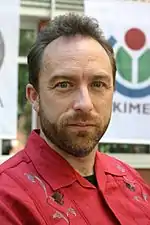
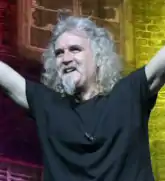
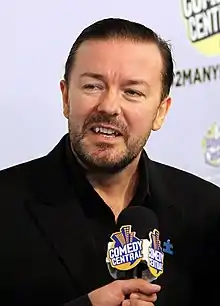

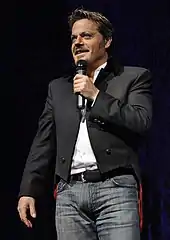
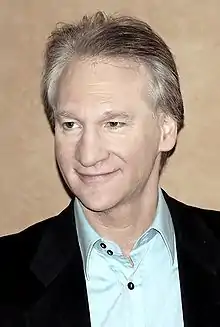

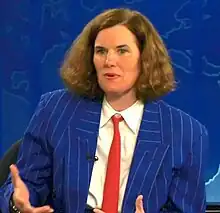
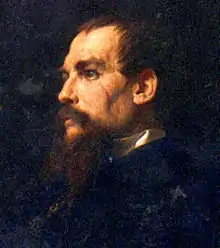
_(cropped).jpg.webp)

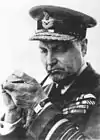
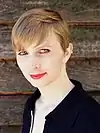

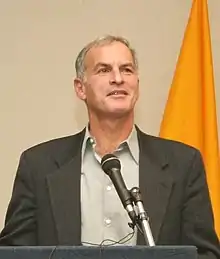
.jpg.webp)

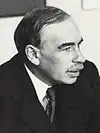

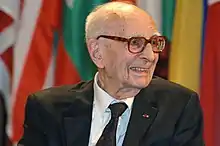
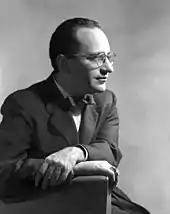
.jpg.webp)

